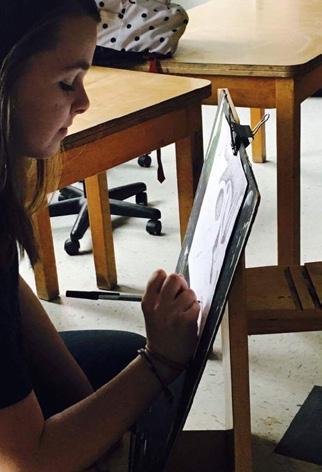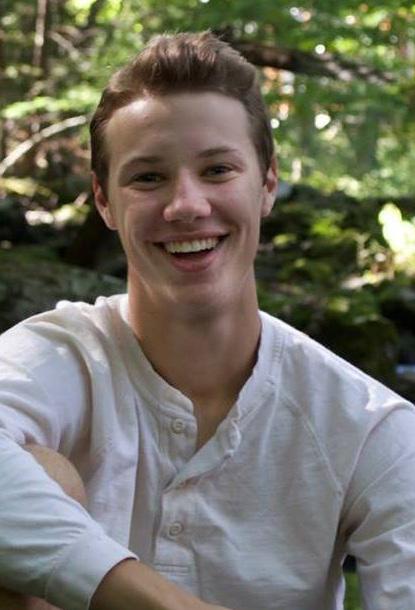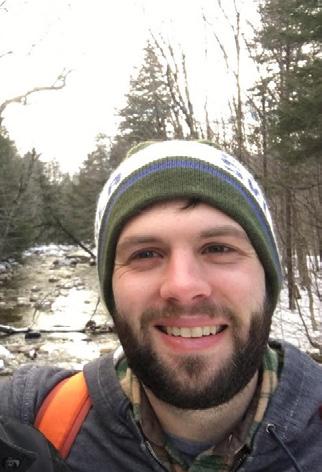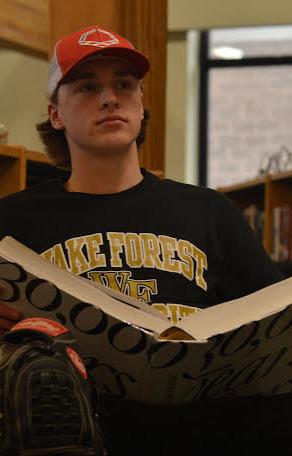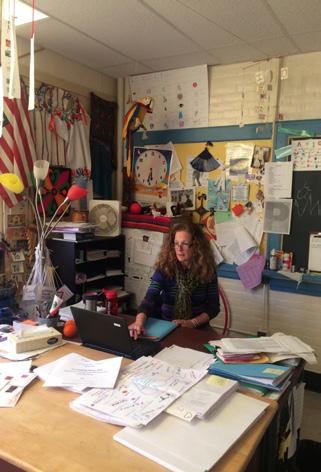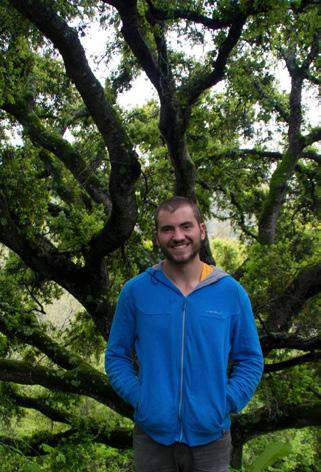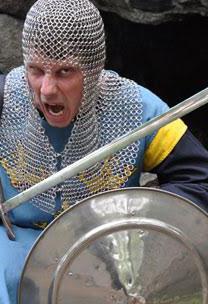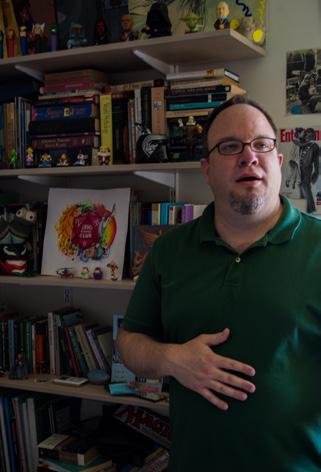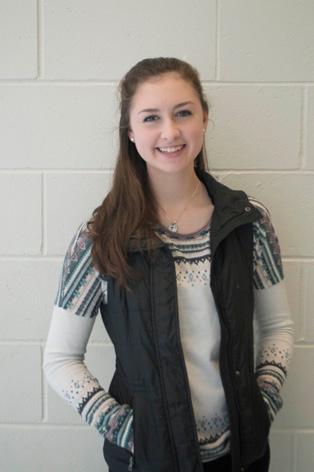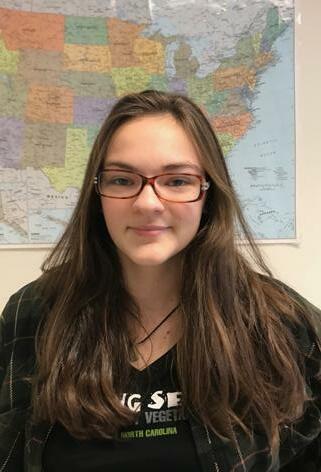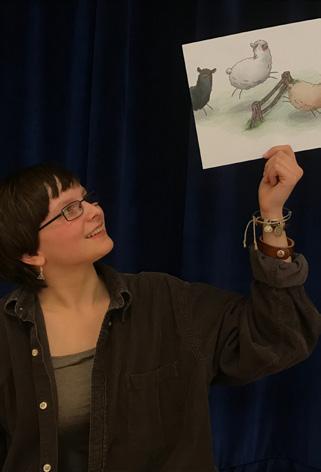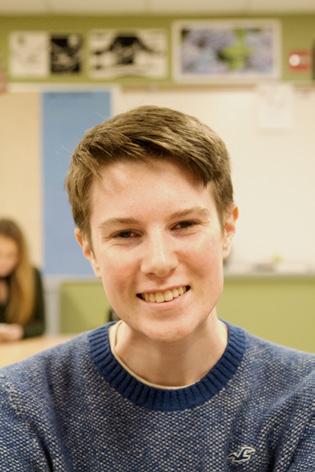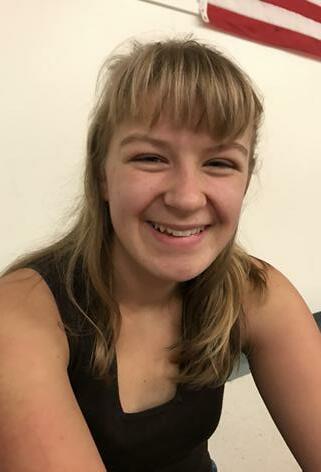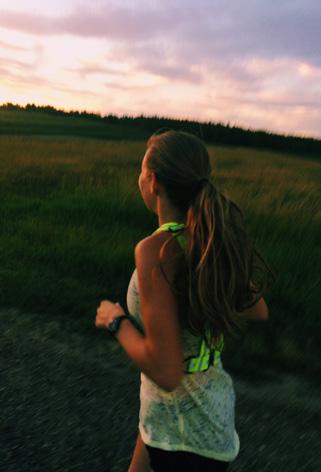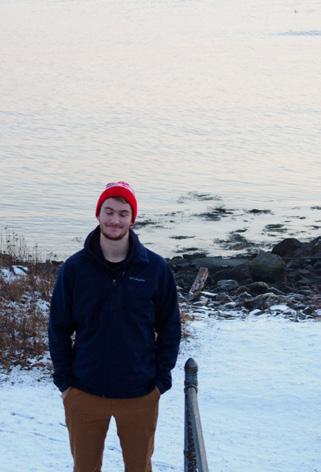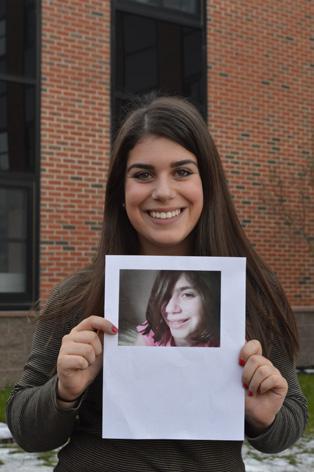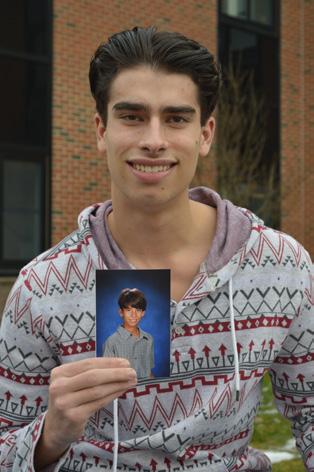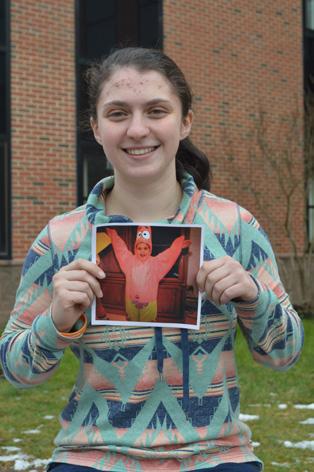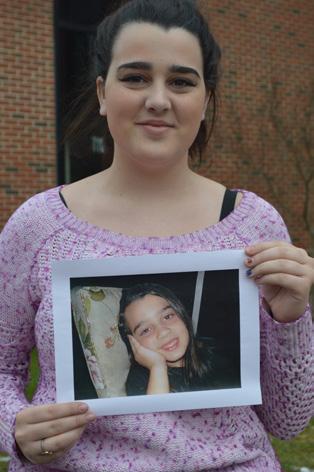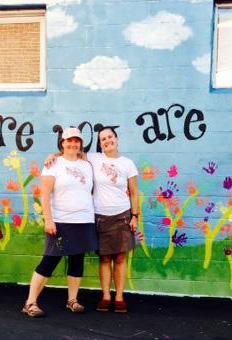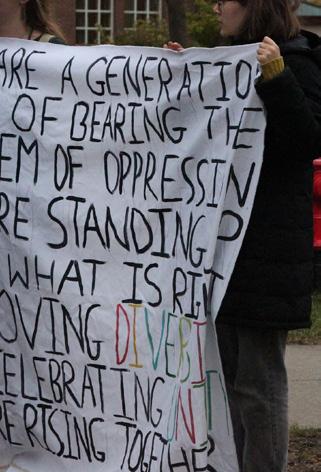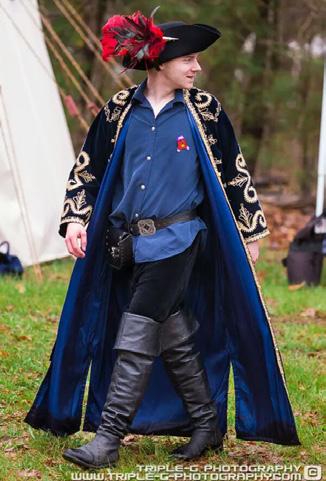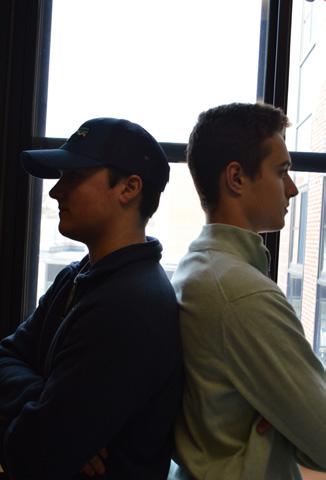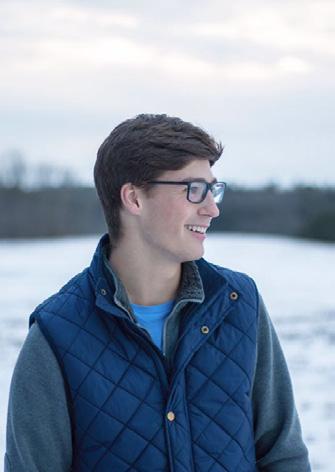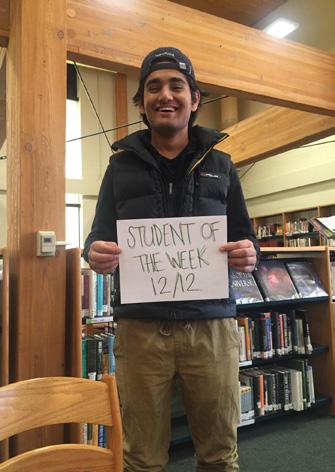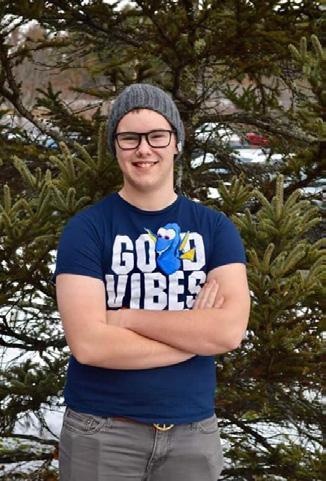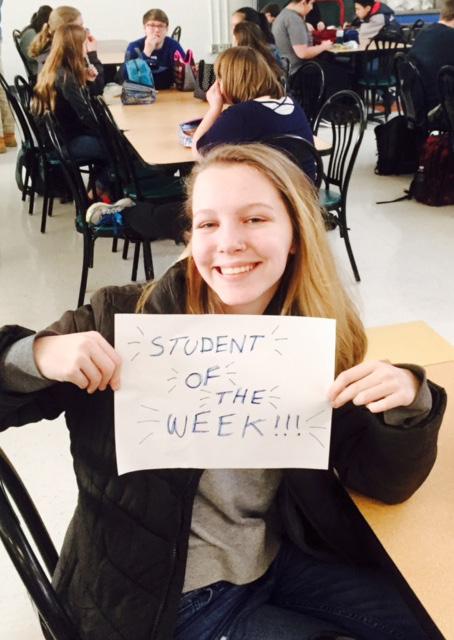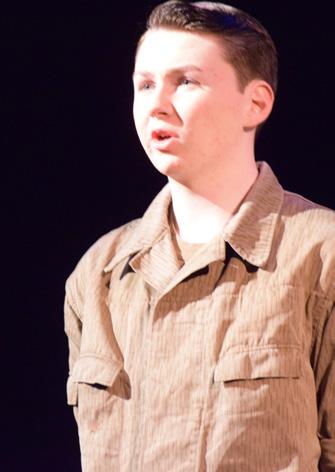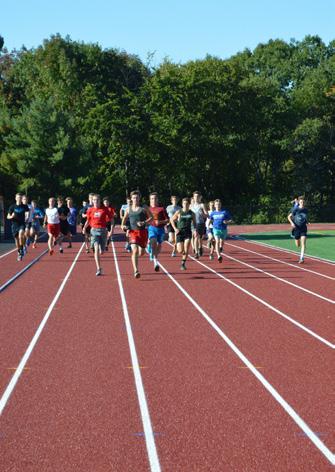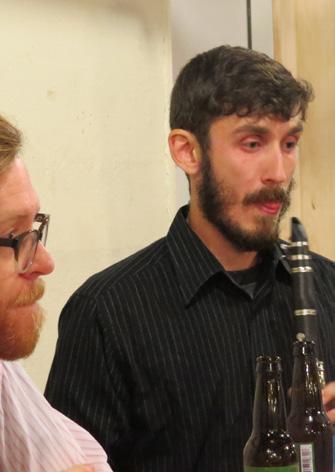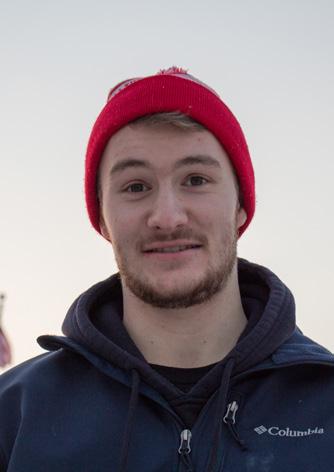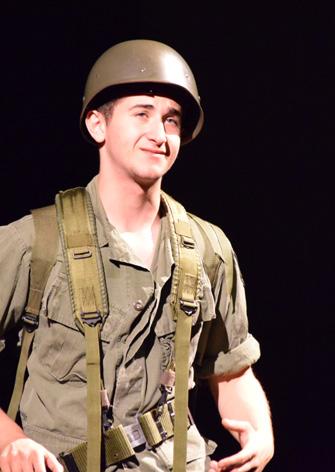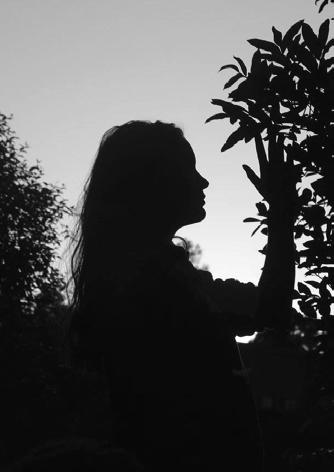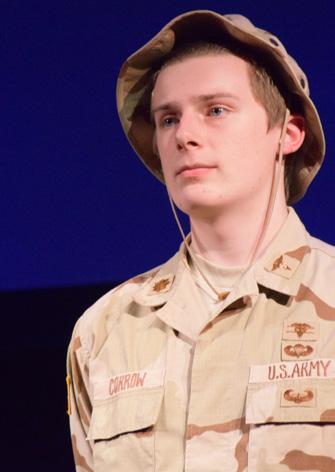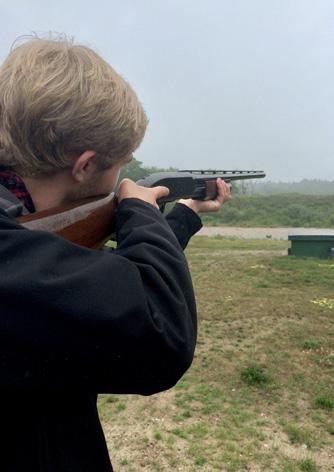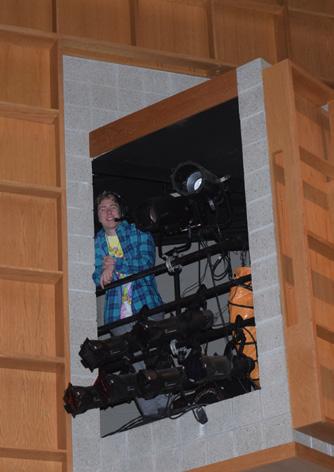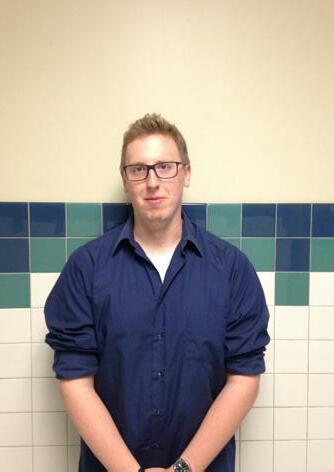
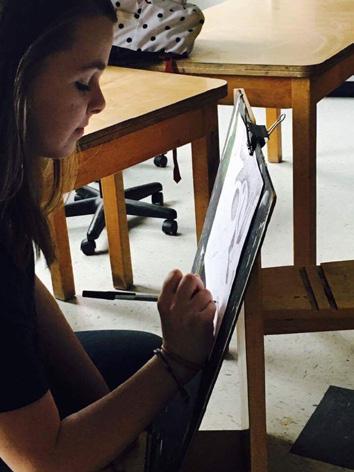
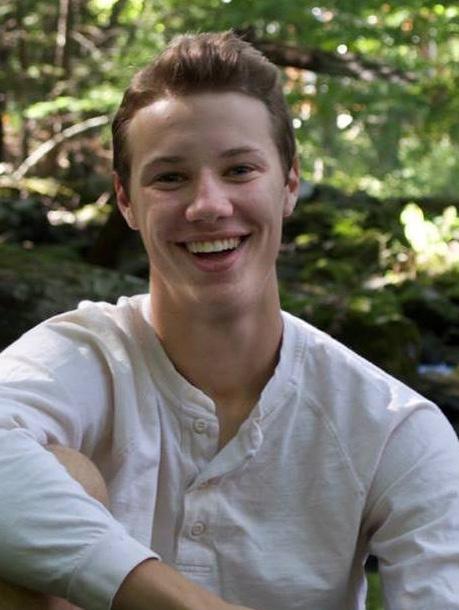
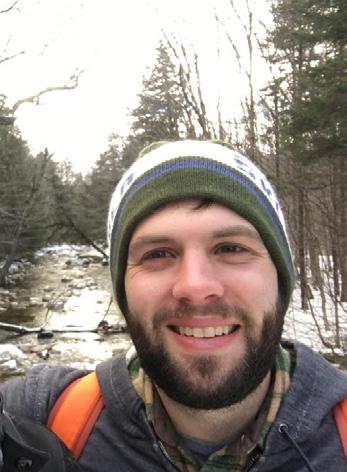
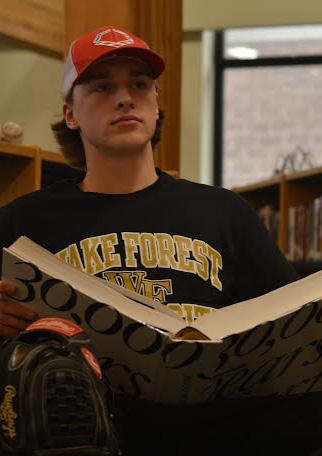
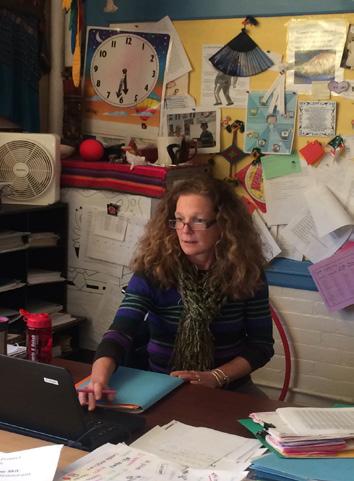
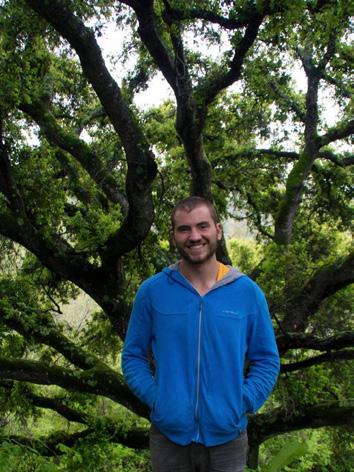
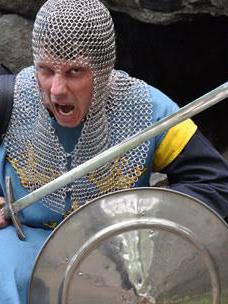
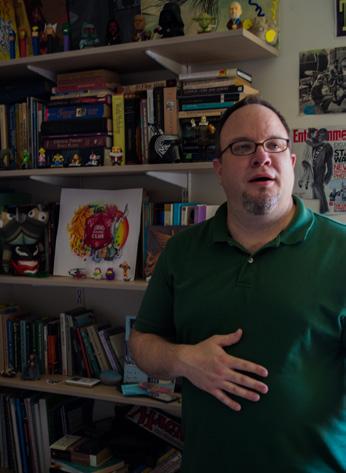
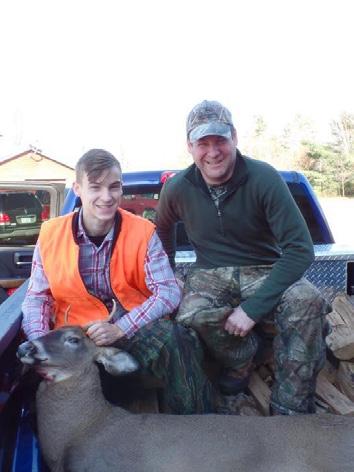
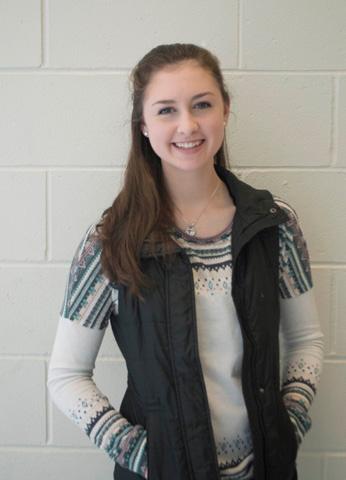
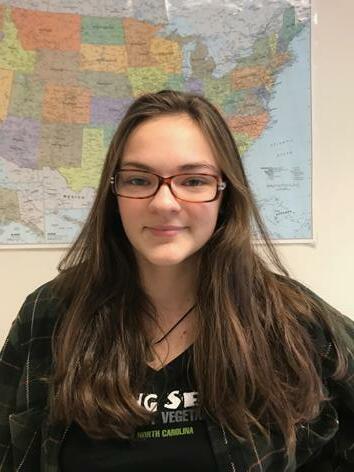
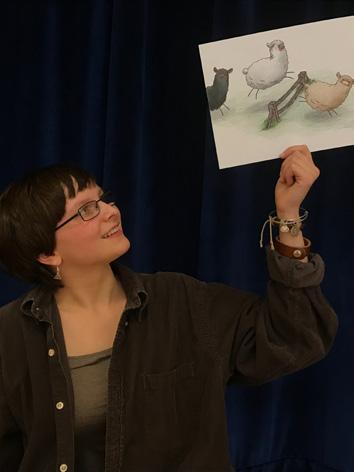
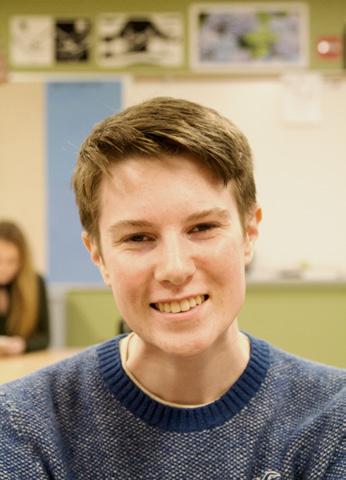
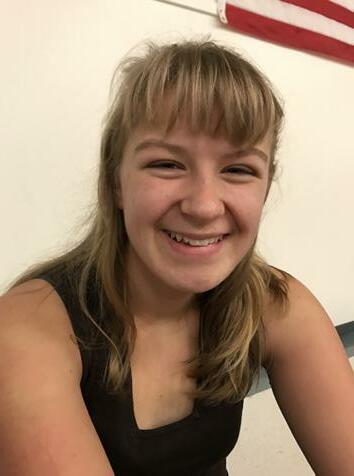


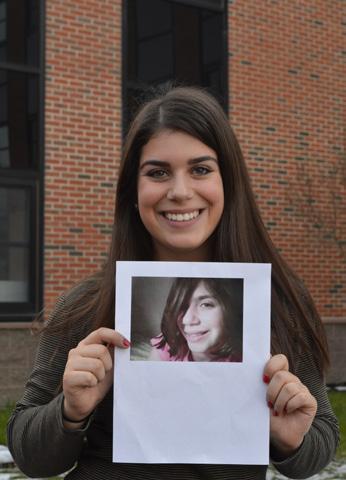
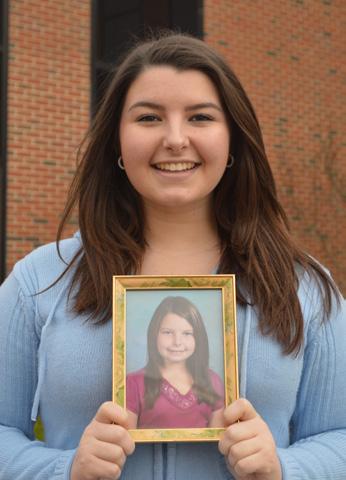
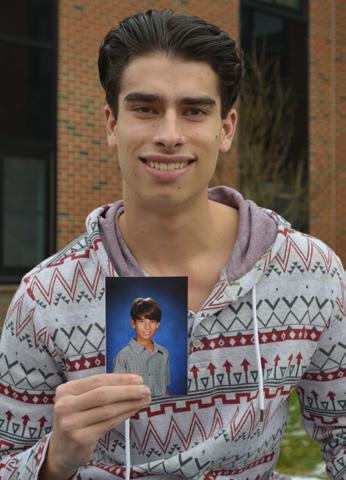
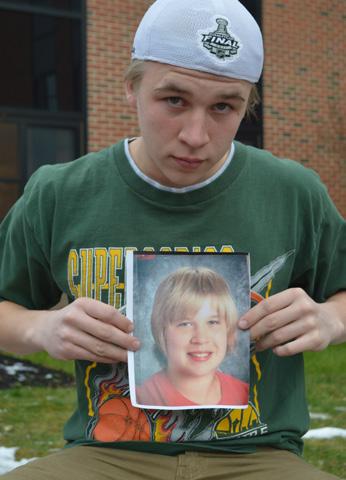
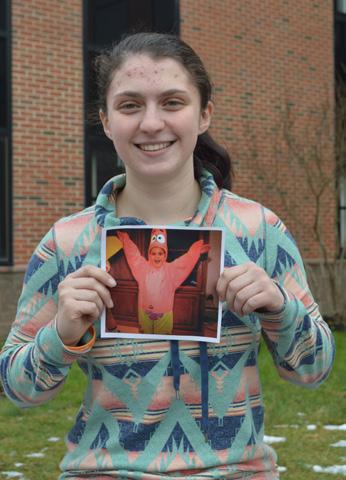
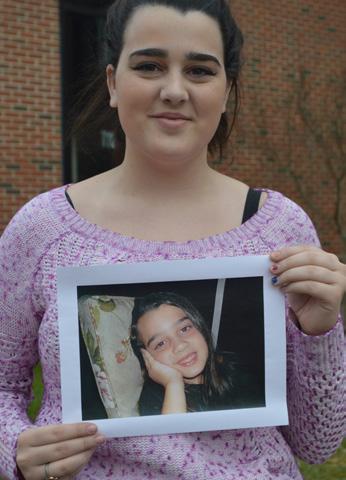
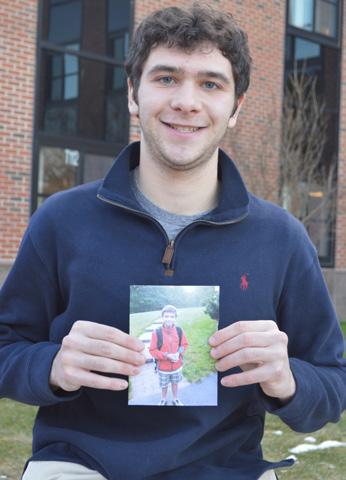
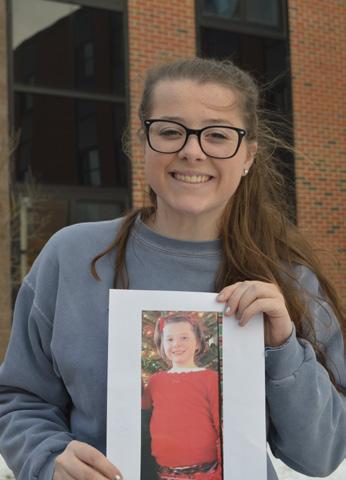
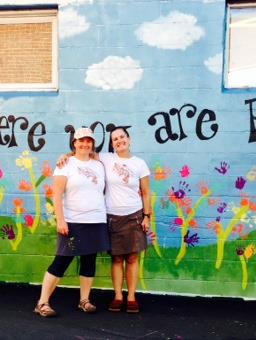
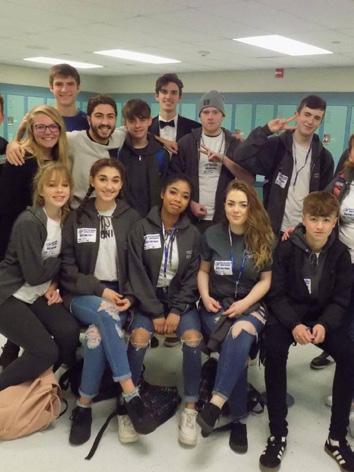
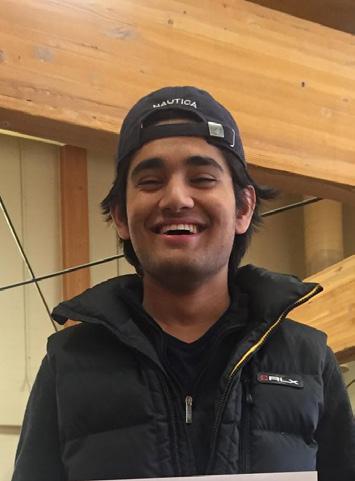
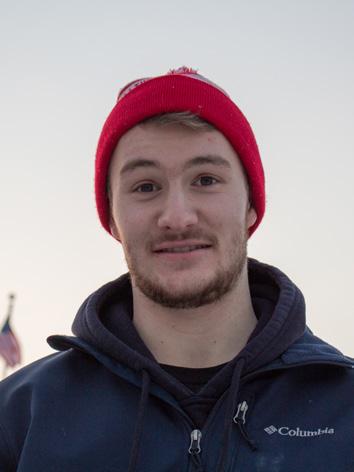
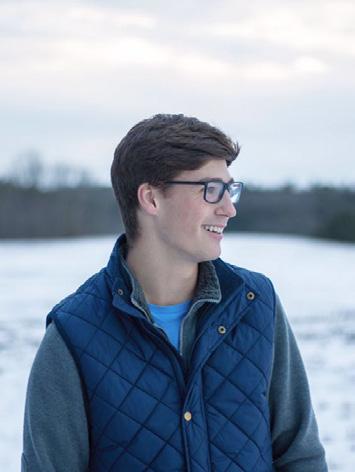 Mouth of the River Publication of Oyster River High School
Winter 2016 02
Mouth of the River Publication of Oyster River High School
Winter 2016 02






























 Mouth of the River Publication of Oyster River High School
Winter 2016 02
Mouth of the River Publication of Oyster River High School
Winter 2016 02

New Start Time pg. 3
The Fishbowl pg. 5
Language Acquision pg. 7 Security Cameras pg. 9

Peseverence pg. 10 Game Club pg. 11 Urban Exploration pg. 13 Bullied pg. 15 Hunting pg. 17
Van Life pg. 19

Jenna Howland pg. 22
Transformations pg. 23
Oyster River “Geek” pg. 25 Nathan Limric pg. 26
Aphantasia pg. 29 Whiz Kids pg. 30
Jackie MacMullan pg. 31
Patrick O’Brien pg. 33
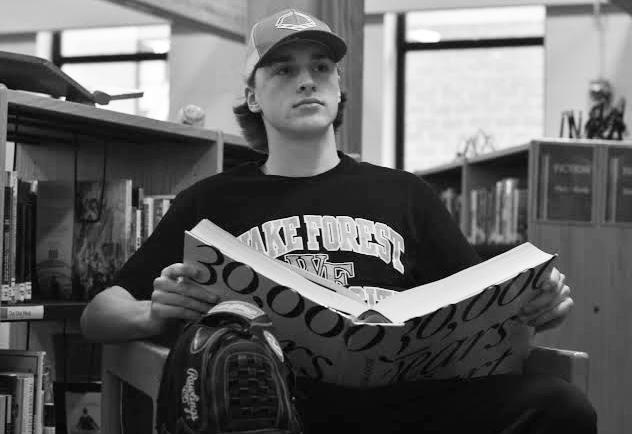
Brennen Oxford pg. 35
Fantasy Football pg. 36 Poker: Ben Sulsky pg. 37
Over the course of the presidential election, the communities in our country have diverged on the basis of politics. In many cases we have grown dependent on whether or not someone is a Trump or Hillary supporter, letting this dictate our social interactions. We have allowed belief to become a brand name of who someone is as a human being. However, the Mouth of the River staff has brought to you our second issue of the year, in an effort to bring the community back together. As you open this issue you’ll find that each person has a complex story of their own life experiences, despite their political beliefs, and at the end of the day each one of us is living life day by day. We hope that while you explore the stories of those featured in this issue, you can find a common ground shared with an individual, despite major differences that may be prevalent at first glance.
Throughout the course of working on this issue, the staff has compiled a diverse arrangement of stories, not only within this issue but also online (see QR code). We have worked every day, bringing a voice to our community. Our mission has been to explore those unheard voices, and bring life to their words. I am extremely proud of how the staff has developed from our first issue of the year, and I am thankful to be a part of this experience. Learning the stories of our community has been one of the most valuable aspects of being a part of Mouth of the River, and bringing the community together is one of the greatest outcomes of our publication.
I want to personally thank you for picking up this issue, and for all of the support we have received as a publication. Our audience is what drives us to achieve our final product, and we hope to continue to provide stories that give a podium for the voices of our community. It has been an honor to finish our second issue, and to finally be able to distribute our hard work.
Andrea Staples Co-Editor in Chief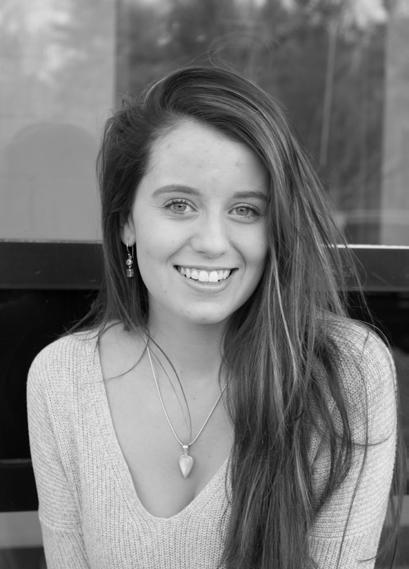
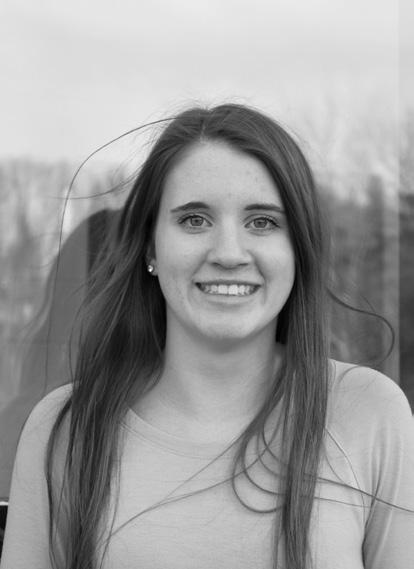
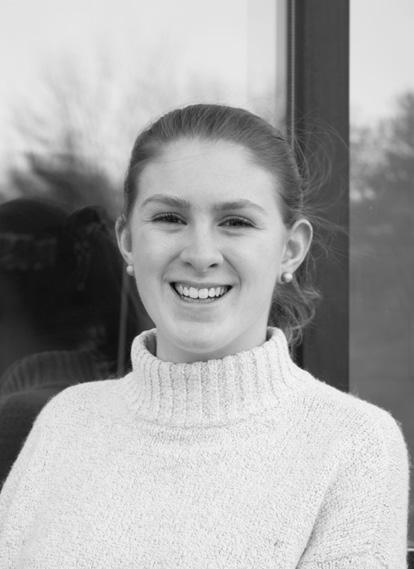

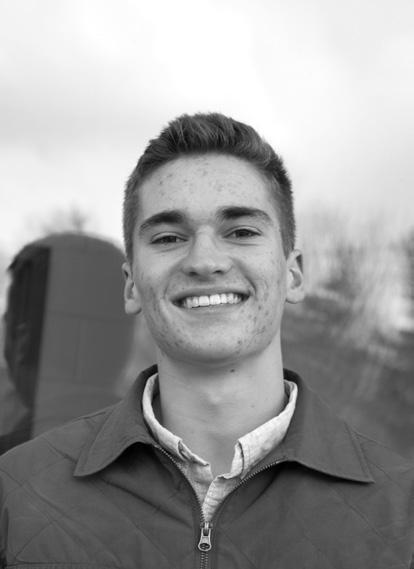
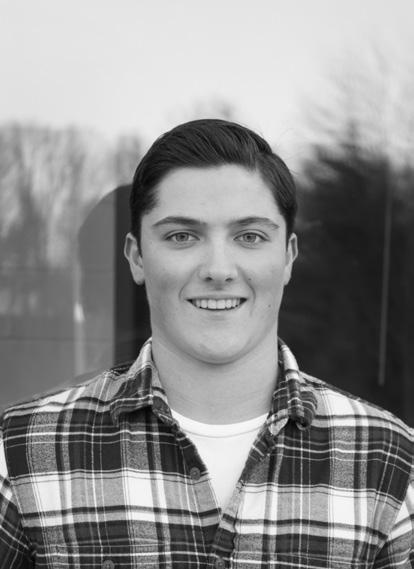
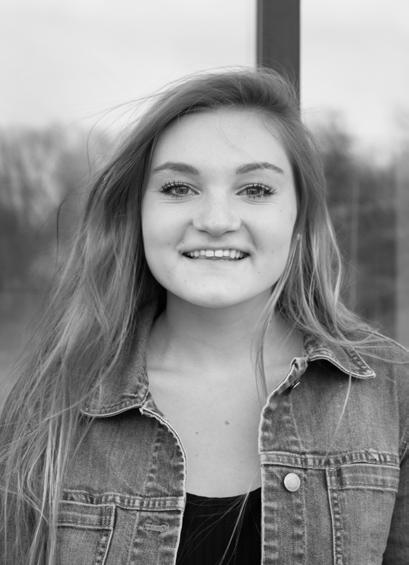

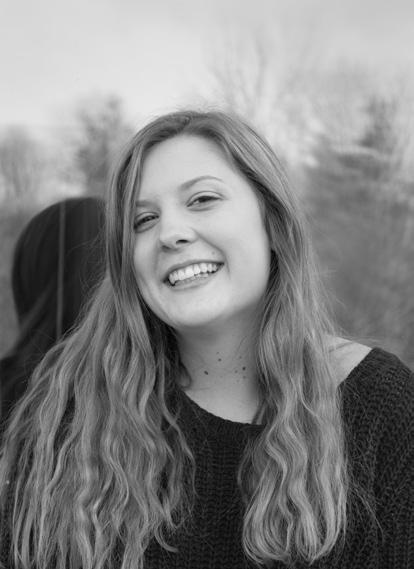



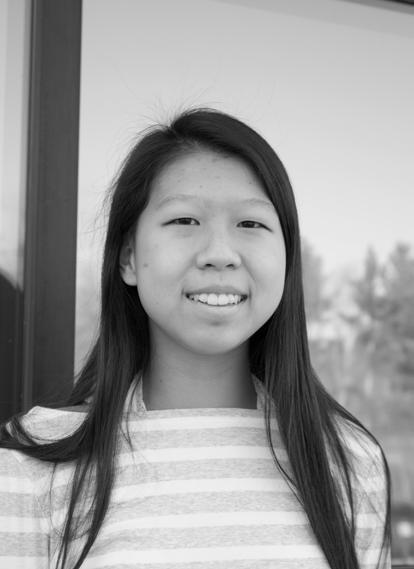

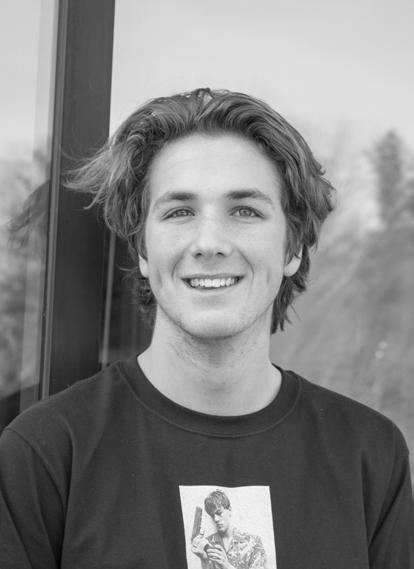


After months of debating, discussing, and voting, the Oyster River School Board has come to a decision. The vote to change the start time passed, and will be instated in Fall 2017.
There has been speculation as to what the new official start times will be. ORHS School Board member Allan Howland offered some clarification. He said, “the hope is that the high school would start at 8:15 am and would end at 3:00 pm. The elementary schools should stay the same. They would start at 8:45 am, and would end ten minutes earlier at 3:00 pm. The big thing is that the high schoolers would all take the bus in the morning as they currently do, and the elementary kids would as well. There would be a two bus run setup, and in the after noon there would be just one bus run.”
ORCSD Superintendent, Dr. James Morse, discussed the rea sons for the change. He said, “we looked at it as a mental well ness decision, not a late start decision. If parents and students take up the opportunity to allow for the students to sleep later, what you’ll get is a student who is ready to learn, who drove safely to school, who was more alert throughout the day. The research indicates that sleep deprivation is one of the leading causes of car accidents for teens. So, what we’re hoping is stu dents will take advantage of it. I think many will.”
Dr. Morse also discussed the purpose of late start time, say ing, “The overlying goal is to provide an opportunity and I think this is the piece that people miss. People think just be cause we moved the start time 45 minutes later that automat ically students are going to sleep 45 minutes later. All it does
is provide an opportunity for students to sleep later. It doesn’t dictate that they will because we don’t control the student’s life beyond high school.”

As with most changes, there has been a mixed reaction from the school and community. The vote to pass later start time was unanimous except for one school board member, and the student representative Troy LaPolice (‘17). LaPolice described his process in deciding whether to vote yes or no, saying, “I did conduct that survey that we did in advisory and the results were really split 50/50 with a slight, pretty negligible amount more not in favor. A lot of people have been pretty vocal in bringing up concerns they had with it. It seemed to be that that was what the vibe of the students was.” By going by the vibe of the students, LaPolice listened to the popular opinion of the students, and voted in the way he thought most accurately rep resented the students. He went on to say that he believes that as long as work continues to be done, the late start time will overall be a good thing for the students.
As LaPolice’s survey demonstrated, opinions of ORHS stu dents are split. Caroline Wilson (’17) said, “I personally was not in favor of the later start time. I feel like it’s just a trend that the school is trying to appease and make happen. I feel like it’s just a band-aid on the real issue at hand of mental health and stress and homework management.” Lily Doody (‘20) agrees with Wilson. Doody particularly expressed concerns with af ter school activities. She said, “As a winter runner, we practice outside daily. Practice finishes just after the sun sets, but with this new start time it will be pitch black by the time we finish
“We looked at it as a mental health decision, not a late start decision.”
practices. Considering we run all around downtown Durham, already using precautions, running in the pitch black will put athletes at greater danger.”
On the flip side, some students are looking forward to the change. Signé Kula (‘20) said she is excited about late start time because “it gives an opportunity for an increased amount of sleep that would improve focus and our studies.” Anna Hard castle (‘19) agrees with Kula that more opportunities will be gained from this change. She said, “If you take advantage of it and go to sleep at the same time [that you currently do] you’ll end up getting a better night’s sleep. Or, you could wake up early in the morning and do homework if you need to or you could eat breakfast because right now, I never have time to eat breakfast before school.”
According to “Backgrounder: Later School Start Times” by The National Sleep Foundation, high school students should be getting an average of 9.25 hours of sleep per night, but in re ality they average fewer than 7 hours per night. Next year, the regular start time at ORHS will be moved up by approximately 45 minutes. According to the National Center for Education Statistics, the national average for public high school start time in the U.S. is 7:59 a.m. This change will put ORHS at a start time later than average.
One concern regarding drop off was brought up by school board member Denise Day. She said, “an issue that I was very concerned about was how the change would impact working parents who need to drop off their kids by a certain time. It was for that reason that I pushed for an early drop off option at both the middle and high schools.”
Another concern brought up was the possibility of common alities such as early sports dismissals causing students to miss a lot of class towards the end of the day. ORHS Principal Su zanne Filippone suggested a solution. At the November 2nd School Board meeting, she said, “one of the things we’ve dis cussed is adding a flex block at the end of the day to help with homework as well as with dismissals.”
Filippone began working as the new ORHS principal right in the midst of the late start discussion. She said,“I think we’re go ing to have to make some scheduling changes, so that will have an effect on kids and teachers. I think that one of the concerns that was brought up by multiple people including the board members was the concern about sports and kids leaving early. One of the things we’ll have to do is look at the end of the day and see how we can use the end of the day effectively for kids but not have it detrimental if it gets pulled for sports.”
Artwork by Sophie GraffFilippone touched on some of the key worries of those not in favor of the late start time. She says, “It’s a hot topic and peo ple have opinions but I didn’t view [them] as being negative, but more of [giving] an opposite view, and the things they were saying are really important. We need to remember [these points] because there are people in the community that don’t agree with the late start time and I don’t want to be dismis sive of that. I want to make sure that we take their concerns into consideration.” Filippone, like many people in the ORHS community, believes that late start time will be a good thing in the long run. She closed with, “I’m hoping we can make it a positive change.”
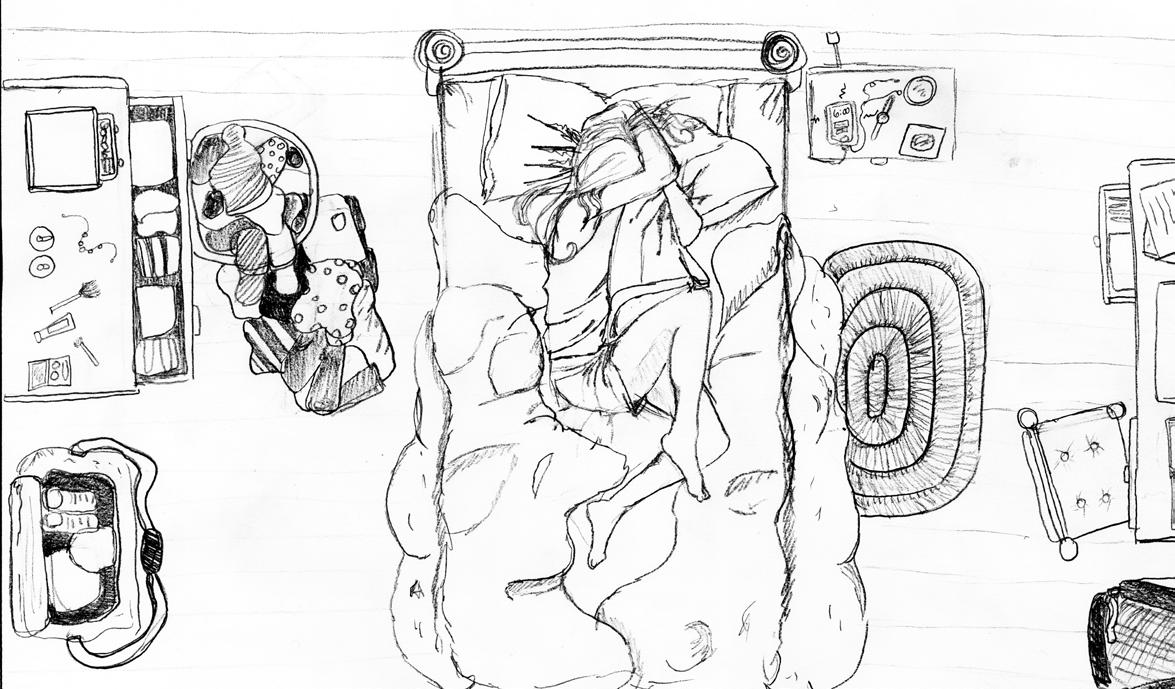
“I’m hoping we can make it a positive change.”

This year, Oyster River High School’s drama department will welcome their first ever student-written one act play.
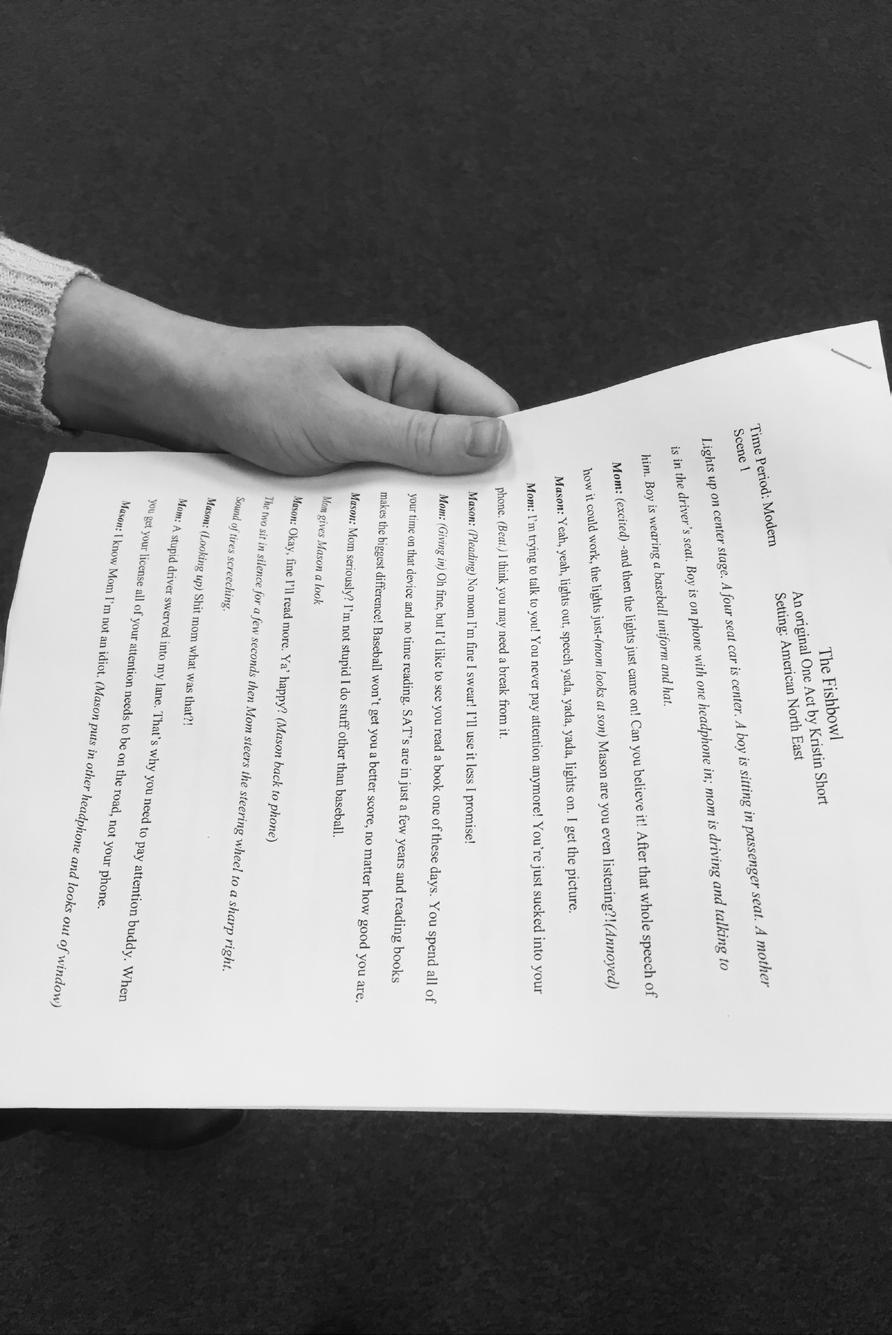
Kristin Short (‘17) is the writer and co-director of this year’s one act play at ORHS. This is impressive considering that the one act goes to competition each year and this is the first ever stu dent-written play. Short will be going into the competition with a completely different mindset compared to past years.
Short’s play is called The Fishbowl and was started in her ex pository writing class last year. Short said, “I wrote most of it in one day and the whole script in about a week. I left it through the spring and over the summer but came back to it this fall. I edited, added in monologues and made a lot of changes.” Writing the script came with difficulties for Short. “When you write a paper you can write in one voice but in a play you have to find others voices. Everyone talks in a different way. I also had to get the con versation to feel natural while still getting the points across that I wanted to,” Short stated.
When Short finished her script she brought it into Mrs.Caple, the ORHS drama teacher, to read. “I read it and thought it had a great message. I could picture it in my head; I could picture di recting it and producing it,” said Caple. She continued, “I’ve never done this before. But, knowing Kristin she will be very organized and will have a plan going in. I’m co-directing so I’m going to just help guide her.”
The entire show takes place in a car and focuses on the life of a boy in high school. There are three main characters, the boy, his best friend, and his girlfriend. Throughout the show there are monologues all about the boy’s life.
Short has acted in the past so this year will come with major changes for her. Along with the difference of directing instead of acting, Short will have to attend the directors forum instead of the students forum for judging. The forum tends to be tougher than the friendly student forum. Short said, “I’m most worried that people aren’t going to like it. I’m really proud of it but we take it to competition with judges who will critique it a lot. They’ll critique the script, the acting, the directors and the light choices which is stressful to think about.”
In the past Short has acted in two one act plays as well as three musicals and fall plays. She played one of the main characters in last year’s one act, CheckPlease , which was a first for her. “At first it was really nerve racking because I was onstage for half the show and I had more lines than I ever had before. But after my first scene I always fell into a strangely calm state that let me have fun and not be so nervous,” Short said.
Short is excited about being on the opposite side. She said, “During rehearsals we sit and do a scene as Caple blocks it out and sometimes when we don’t know what we are doing we throw out suggestions for her and she will think about them. I’ve always enjoyed throwing out suggestions and the idea of not only writing the one act but directing it, making the decisions and taking other people’s ideas and putting them into my overall idea will be exciting.”
The actors will have a large change as well. Instead of viewing Short as a fellow actor they will have to respect her position as a director. Sarah Corrow (‘17), who has acted in many productions at ORHS, says, “I think we are all going to do a great job at making the transition. I also think that with a student director, the acting and material is going to be much more relatable to an audience of teenagers and young adults.”
With a relatable script that is a mix of comedy and drama, ORHS’ drama department will move into competition with the hopes of doing well. Short said,“Ideally I would love to make it to the state competition which is the second round but my main hope for this show is for it to be something that the cast and I can be proud of.”
To see Short’s play, come to ORHS on March 31 or April 1 for the community show.
“When you write a paper you can write in one voice but in a play you have to find oth ers voices. Everyone talks in a different way.”
At thirteen years old I was a newly minted teen. Short and a little overweight, I had just started 7th grade and my first year of formal education in foreign language. After seeing the success of my older brother Patrick with the French language, I followed his lead. I had high hopes of learning to communicate in a language other than my na tive English. These hopes soon diminished when I got back my first quiz grade of a 63. This trend continued throughout the year. I would sometimes study hard for a quiz, but then come exam I’d bomb. Hard. High school was no better; switching to Spanish I barely hung on. The class dropped my GPA like it was hot. My junior year I dropped Spanish 3 two weeks in. This is a frustrating time for me as my GPA suffered and college requirements hung over my head like a boul der. I blamed my teachers, and the language itself for my failures. I could get sometimes get a couple of transla tions committed to memory, but I couldn’t speak a lick of the language beyond greetings and mismash of phrases. My experience with world languages is shared by many. Given that a first language is picked up through direct exposure of parents and community members talking, it is difficult to replicate these conditions in a classroom setting. Most world language classes I’ve taken rely on translation based quizzes and exams to test students on their understanding of vocab. In order to study for these I would write the word in English and then the translation on the other side. There lay my issue.
Lina Lee, professor of Spanish and Linguistics at the Uni versity of New Hampshire, helped me realize why I strug gled. Since we have already acquired a first language, learning a second language there is, “a lot of interference. Be cause we already have a first language built, our [brain] resists. When we hear a sound that is very different from our language we automatically don’t want it...There is something called native language and target language interference. [When] a student tries to translate there a is a negative transfer.” Negative trans fer is when past knowledge that interferes with acquiring and understanding new knowledge. Part of learning a second lan guage is overcoming conflicts with your first. Translating be tween languages poses issues as you aren’t learning a new lan guage you’re simply associating a familiar term with a foreign.
Languages aren’t meant to be translated between each oth er; languages have been developed over time by its speakers in order to communicate with each other. “To give an example of this in spanish when you want to say ‘I’m embarrassed’ and you try and translate this the language becomes ‘I’m pregnant,” said Professor Lee. Ideas and phrases can not be simple plugged and chugged into a totally different language. There are rules and in terpretations to be accounted for, which is why language is unlike
any other subject. And why it presents itself as such a challenge. It is fairly common knowledge that the younger you are the easier you learn a language. This is nature of the brain. Younger students have more neural plasticity, their brains more eager for knowledge to interpret and to build new neural pathways around. That is why it seems so easy for kids to learn new words or ideas, while it’s seemingly impossible to teach an old dog a new trick. The power of youth’s neural plasticity can be summed up with a TV remote and my dad. Almost every day my dad returns from work and sits down to watch TV. And almost everyday I will hear him yelling for me that the darn TV is broken and that I need to come down and fix it. Almost every time it will be a trivial problem like he is hitting the volume button instead of the power. Mean while if you handed a six year old a remote, they will have turned the TV on and found their favorite show faster than you can yell ‘Spongebob Squarepants’. This is not to say that someone my dad’s age couldn’t learn a language, it would just be much harder than it would take a youngin’. Kids are much more intuitive than we give them credit for, which is why it’s important to learn a lan guage sooner rather than later. Age is not the only variable in ac quiring a language, it also depends on how you learn a language.

Actively listening and immersing yourself in a language can have a dramatic effect on your ability to acquire the lan guage. “The best of the best way [to learn a language] is to go abroad and throw yourself into it.” said Professor Lee. Short of a seven hour plane ride to Spain or France, Oyster Riv er Middle School’s Organic World Language initiative is the next best thing. Teaching in an environment similar to the one in which we ac quired our first language is the driving force behind the program. Walking into Emma Bricker’s World Language classroom I could tell it wasn’t like any other classroom I’ve been in. Besides Bricker’s desk and three chairs over by the computer, the room was empty. “We sit on the floor or yoga mats,” said Bricker. Desks just didn’t fit into her desired classroom,“I [asked] could you take my desk away, and they said yes, but if we take them away then we’re not giving them back, and I said okay.” This is also some thing her former students heavily noted when recollecting about the class. The initiative is based around language emersion, with students speaking ex clusively in Spanish, “We leave English at the door,” said Bricker. Bricker uses “comprehensive input” when she speaks in Spanish, these are specific words and grammar might not be entirely understood but the idea behind them is. Students have a large input into what they learn, as students are more likely to remember things they care about. Almost every wall of Bricker’s classroom is lined with whiteboards and blackboards filled with vocabulary words that students have generated. Test and quizzes are not translate this conjugate that, they are write a paragraph, fill-in-the-blank or an oral quiz.
OWL started as Brickers pet project three years ago, but soon was adapted for the entire World Language department at ORMS. “I can’t imagine teaching any other way now,” said Bricker.
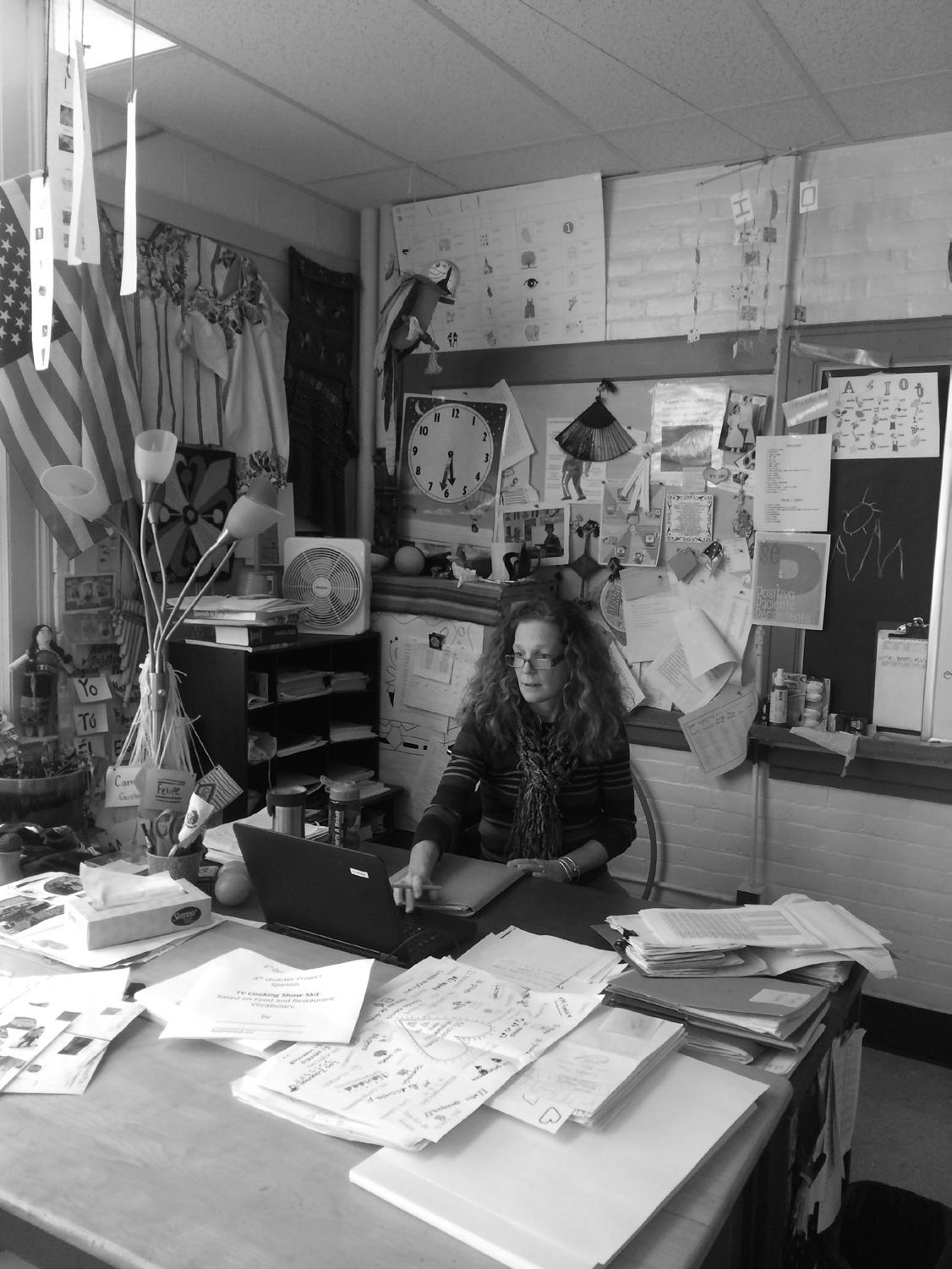
Shadowing the class, I was pleasantly surprised by the atmosphere of the room. Not only did it seem that the kids were eager to learn, they actively immersed themselves in the language. Before the start of the class some of the kids spoke among each other in Spanish, even though Ms. Bricker was well out of earshot. They attempted to fill in missing terms, often looking to each other for assistantance. I could tell that some students relished the opportunity to be free of the bonds of desk and chairs (there was a girl that attempted to sit in a chair, which is frowned up). Ignoring the advantage neural plasticity gives the younger students over me, the kids certainly spoke better spanish than I ever did.

As with any way of learning, this methodology does not fit with ev eryone’s style. I could see myself thriving in an OWL classroom, as I am an energetic and responsive person. For others they might find the original setup of memorization to be a more desirable method, chairs and desk included. At least for me, I think immersing myself in a language program would work better than flashcard translations. Ac quiring a language is all about finding the method that works for you; as Professor Lee said repeatedly, “Everyone can learn a language.”
-Dillon MulhernOyster River High School is considered to be among the high est achieving schools in the state of New Hampshire. We have excellent teachers, an average SAT score of 1260, and a grad uation rate of over 95%. Physical skirmishes between students are very few and far between, and most students say that they feel safe in school every day. So, it may come as a surprise that the school voted to spend roughly $30,000 to improve school security cameras in, around, and outside the school building itself in order to improve school safety.
“It really came down to the fact that we had a lot of blind spots, exterior and interior,” says Mark Milliken, Dean of Faculty at ORHS. “It’s just a liability to have spots where suspicious activ ity happens that we can’t see.”
Instead of just adding more cameras, the school chose to replace all old cameras with brand new ones that have a much better capability of seeing what goes on around them. They view activity from all 360 degrees, and in much higher defini tion than the old cameras. The cameras have been placed so that there are hardly any locations on campus that are not visible, from senior lot all the way to junior lot.
The new cameras have already helped the administration see and address issues that would otherwise not be noticed by them with the naked eye, or with the old security cams. The addi tion of cameras on the third floor in the ‘T’ has also helped to prevent unwanted activity from occurring there, especially in the bathrooms. The cameras cannot see into the bathrooms of course, but they can see everybody that goes in and out of them at what time. The cafeteria also has much better coverage, which Milliken says has helped with a theft problem at the lost and found station that has been recurrent in past years.
The cameras have also helped with monitoring activity in volving vehicles, an area not well covered by the old camera system. Not all activity caught on camera has to do with stu dents doing suspicious activities outside of their vehicles – al though cameras did catch a hit-and-run incident where a driv er clipped a student’s car before fleeing the area. The cameras

were able to give video evidence of the guilty driver.
However, some students don’t feel that the cameras are the best way for the school to be spending money. “We could have used the $30,000 to build new bleachers at the sports field, or re-do the basketball court, to name a few things,” says Brennan Oxford (‘18). Devin Sawtelle (‘17) believes that “the cameras are kind of excessive. I don’t know why they feel the need to watch us the entire time we’re in school.”
While some may feel like the administration is invading their privacy or spying on them, Milliken says this is simply not the case. “The cameras aren’t there to spy on students, they’re there to prevent things that shouldn’t [occur] in school from happening, and ultimately to create a safer environment in the school.”


Milliken also says that while the cameras are used to docu ment and investigate questionable activities of students, they can also be of great help when a story needs to be proven true. In one incident after school, a student was accused by another of breaking the law. Upon review of the security camera foot age, the school was able to prove that student’s innocence in the case. “It takes out the whole aspect of the ‘he-said-she-said’ sort of thing... We can use it to find proof when we need it, and in this case it worked out very positively for the student who was accused,” says Milliken.
Milliken strongly believes that the new and improved security cams have helped and will continue to help the safety of the school, and he’s not alone - new principal Suzanne Filippone also thinks that security cameras are a great method for keep ing a safe environment. “Spaulding was not like Oyster River... We had security cameras everywhere, and they were so detailed that they could practically see what color your eyes were,” Filippone says. While Oyster River may not need the same lev el of protection and surveillance that Spaulding has, she says that the cameras can only be beneficial to preventing any illegal activity, or simply any activity that does not belong in school.
Throughout life, many of us will be faced with the loss of a loved one. For some of us, we will go a lifetime rarely meeting the agony that grief encompasses. For oth ers, including myself, this feeling is too easily recognizable.
When I was 13 years old, my father passed away and I couldn’t grasp what I was feeling at the time. I had never lost anyone, let alone someone so close to my heart. I felt betrayed, like something was stolen from me and the only questions I had were “Why him? Why now?” These thoughts lingered in my mind for quite some time, taking over my happiness and enjoyment of being a teenager. One day I realized that I didn’t have to let grief control my life - I had a choice.
I decided that positivity was the key to overcoming my loss, and that without positivity, the route that my life was taking could change for the worst. Day by day, I repeated to my self that the future is bright, and this is what I have lived by.
Focusing on my will to achieve success, I began to make long term goals and planning how I was going to meet them. Self development became critical to my well being, and it served as a constructive way to push away grief’s chains that were wrapped around me - if I couldn’t find happiness in my home, I could find happiness in my achievements and how they were going to shape my future. The excitement for the future drove me to chase after what I wanted it to be; I grew excited for life.
I wanted to develop my intellect, and study not only what my teachers assigned but the world around me. All I de sired was a piece of understanding more than my algebra textbook - whether it was looking at history, culture, soci ety, or how the human mind works. I constantly asked ques tions surrounding life and death and how to approach it.
I picked up a book that my brother lent me called The Ti betan Book of Living and Dying, and I recommend it for anyone who is struggling with coping. It showed me more
about life than I could comprehend at first. Without it, I don’t think I could have come to terms with my father’s death. I found a greater appreciation for life, and treated it as a gift.

There were several steps of reality I had to face in order to cope with the loss of my father. First, I had to recog nize that no matter what life throws at you, it’ll never slow down or stop. You have to take grief and use it as a reason to live - a reason to take advantage of every moment of each day. No matter how hard it was, or how much I want ed to give up and let the grief consume me, I had to push myself out of bed each day, and recognize that life is a gift.
After realizing that I couldn’t let grief take control of my life, I found that I had to stop feeling guilty about my father’s death. There were days that I just begged for one more conversation, one more hug, one last look into his big brown eyes. This was only harmful to myself because it only made me regret not taking advantage of every moment that I was able to spend with him. This realization alone has improved my relationship with people who are important to me, because it is so easy to forget that anyone’s life could be taken on any given day.
The last step was realizing that although I am just one of the 7.4 billion people walking this earth, I have a tremendous amount of power and opportunity in my hands. I strive to be more than average, and to take each day as a lesson to learn.
I appreciate life more than I did before - I find valuable mo ments each day, from simply laughing with friends to coming home and snuggling with my dogs. I will never take my life for granted, and I’ll always fight for happiness and fulfillment. However, I don’t believe that life is a fairytale, and believing this will make life’s hardships more difficult to face. I do be lieve that I can get through anything that comes my way, and that nothing will stop me from making my own happiness.
How I used my will to achieve success to cope with my father’s passingIn honor of my Father, Nana Staples, Aunt Suzanne, Grammy Long, and Grandpa Hutch -Andrea Staples
“Ithink it’s great that the school allows for Game Club to exist. There are many schools that wouldn’t do that or provide money for it. I think it shows that the school likes to provide for a diverse array of kids, not just those that are talented artists, athletes, or actors,” said Mike Saufley, a paraprofessional and a supervisor of Oyster River High School’s Game Club.
The ORHS Game Club has been around for nine years, according to Trevor Garman, the teacher who created the club and currently hosts it in his room. The club is a place where students (and adults) who enjoy tabletop games can play them. Tabletop games include board games, card games, and roleplaying games. Announcements for the club at the school can be heard ending in the words: all are welcome. I’ve been a participant in the club since I was a freshman, and I can say that I’ve seen this embraced since the moment I joined the club.

Coming from Barrington Middle School to ORHS gave me a degree of culture shock to say the least. For me, and many others, BMS was not a fun place. Besides the social darwinism that predominated life in the lunch room, there was not the slightest glimmer of an extracurricular activi ty where people could have fun without having to fit into a clique. Some friends and I tried to make a game club of my own back in those dark days, but it never numbered more than five people. I was bullied during the school day for ‘playing nerd games’.
This sucked. Imagine if you were tormented constantly for the one hobby you truly enjoyed- If you were mocked for acting in plays or playing sports. I never thought that one day I would be planning to go to college for game
design. At BMS, I thought this was a trade for social outcasts, because that’s all others ever made it out to be.
That changed when I arrived at ORHS. While I was walking to the first meeting of Game Club during my freshman year, I had no idea what to expect. For all I knew, the room would be empty save for a few meek souls, desperately clawing for an inch of social freedom, like in my middle school days. I could not have been more wrong. As I approached Garman’s room at the end of the second floor hallway, I heard a rumble of voices emanating from the door, and a warm yellow glow of cheer. The room was thronged with people, board games, and card games. I was quickly ushered into a game of Magic the Gathering by some people that I had briefly spoken to earlier in the month. These people soon became some of the best friends that I’ve ever had.
I was hooked. Most of my first year in high school was spent playing Magic the Gathering, and running (or DMing) role playing games like Dungeons and Dragons. I guess I did something right, because I was made a leader of game club along with Lydia Ahlstrom (’17) and Jarrod Bernier (‘17) the next year. Following this, I became more and more devoted to tabletop gaming. I poured my heart (and my poor wallet) into these games. I remember all the wonderful stories created because of board gaming and all the amazing friends that I’ve made playing games.
Eventually, I decided I wanted to design my own games. I loved the ef fects that I saw board games inspire in myself and others; it was my hope that I could inspire those same emotions. So, I started writing my own role playing game. I’ve also designed smaller tabletop games, but Heap, the role playing game that I’m designing, is the one I’m most proud of. I am currently playtesting the game in Game Club, and I am so thankful that I have had access to such a nurturing and open place to develop this hobby.
Game Club came about when a couple of Garman’s students completed the board game project in Mythology, and suggested that there be a club where they could play games more often. Garman enjoyed gaming and de cided to make Game Club. The club is meant to be a place where students can feel accepted and have fun playing tabletop games. Garman says there is a deeper part of Game Club, however, that came around unintentionally.
“We had clubs at our school where kids are looking outwards to help their community and the world, and that’s great, but we didn’t have many clubs where kids were looking inwards to help other kids. I’ve tried to help Game Club be a place where kids can look inward to other kids and help those who may feel disenfranchised by society to feel like they have a place where they can be themselves,” said Garman.
I can definitely attest to the success of the mission. Before I joined game club, I was a social outcast. Game Club is the first place where I felt at home and comfortable after my middle school days. I think the place was instrumental in forming a social confidence into my life.
“My older brother was bullied in school, and it really impaired him so cially. My sister, Tracy, was also bullied to the point where she commit ted suicide,” said Garman. “In game club we have an award that I present during the awards ceremony called The Most Noble Order of the Wingi corn. It’s for kids who really get the deeper meaning of Game Club. The name is based on a creation of Tracy’s, the Pegacorn… When I think of kids who really would have needed a place like this, I think of kids like my older brother and my older sister.”
Garman thinks that ORHS doesn’t necessarily need this as much as they did in the 80s or in other schools, because the school is accepting on many levels already. I agree, schools like BMS could use this a lot more, but the effects of the club are still felt here.
Ben Perreault (‘18) is also from Barrington, and was a member of the mea ger game club that I tried to found there. He has been a part of Game Club since he came to ORHS in 2014. I have run many roleplaying games that he’s played in since he joined game club, and we’ve become friends through the joy of playing games.
“Game club is definitely a socially comfortable and accepting place. Re ally people going there are going to have fun, just like you are. It’s a pretty socially accepting environment. You can be yourself and have fun, as long as you aren’t being a jerk,” he said.
“It’s an interesting group that can be a really interesting mixture of stu dents who are really good role models for social skills and some students who may have some challenges with social skills. The students that are really good role models, from what I’ve observed, they do that; they role model. They help set the stage, and I don’t see a lot of judgement in game club. I see an open atmosphere where people learn and play together. There are disag reements, but both adults and role models help work those out,” said Saufley.
Saufley has also played games with me, and helps out by playing other characters in games. He also brings a variety of his own board games for when he’s not helping out around the rest of game club. He agrees that the place is really accepting, but also points to its diversity.
Another aspect of game club is the opportunity to learn real social skills. Perreault feels as though he has improved his social skills through game club, as do I. “You’re there interacting with people who might even get on your nerves, like when people kill everything in a roleplaying game. Deal ing with that is a useful skill,“ he said.
Bernier, a fellow leader of Game Club, has seen this improvement of social skills throughout his experience playing games with people in the club. “I definitely think that people who come to game club improve social skills, since they’re welcome and accepted as whoever they are. You can gain some important social skills, because in game club you can win and lose. People don’t like sore losers or even sore winners. Being exposed to a place where you can win or lose teaches you how to win or lose graciously,” he said.
A lot of this can be attributed to the students themselves being accepting to other students, but the adult supervisors play a huge role too.
“Mr. Garman is the one who started the club, so that’s a huge thing. The fact that there’s an adult there that enjoys all the things that we all do and plays with us as if we’re equals is awesome. Mr. Safuley and Mr. Kelly sometimes do this as well. For the seniors and juniors, this is really cool because although we aren’t adults yet, we can interact with teachers who are super cool people in a place where we are equals, and it’s a really cool interaction,” said Bernier.
Game club is a chill place where people can just hang out and play games. If you’re ever free on a Monday afternoon, feel free to come down to Gar man’s room. I’ll be there running games, and there are plenty of others who will be willing to teach you something fun to play.
-George Philbrick6“The fact that there’s an adult there that enjoys all the things that we all do and plays with us as if we’re equals is awesome.”
12
“I’ve tried to help Game Club be a place where kids can look inward to other kids and help those who may feel disenfranchised by society to feel like they have a place where they can be themselves.”
Lauren Quest and Matt Nixon stepped into the moss covered foyer. As I approached I remembered the strange bike covered in American flags that was propped haphazardly against the back door the first time I visited. Today an equally strange box of about five dozen small white bells had taken its place. Quest, Nixon and I walked further into the abandoned house past the kitchen and into a room of grimey mirrors and old newspapers. Blankets on the floor indicated some sort of recent use, though how recent was anybody’s guess. The two made their way down the stairs to the pitch black basement, carefully stepping over electrical wires and dead rats. I stayed in the kitchen and examined a blank white polaroid, covered in dirt. Bags of old food and trash didn’t phase us as we made our way up the stairs to the second floor. In hindsight I don’t know why these obvious signs of habitation didn’t deter us from going further.
“Hello?” A voice asked weakly from an unseen room, causing us all to jump.
“Uh, hi, we’re not going to hurt you we’re just exploring. We’ll leave,” Quest said with a surprising calmness that did little to soothe my inner panic.
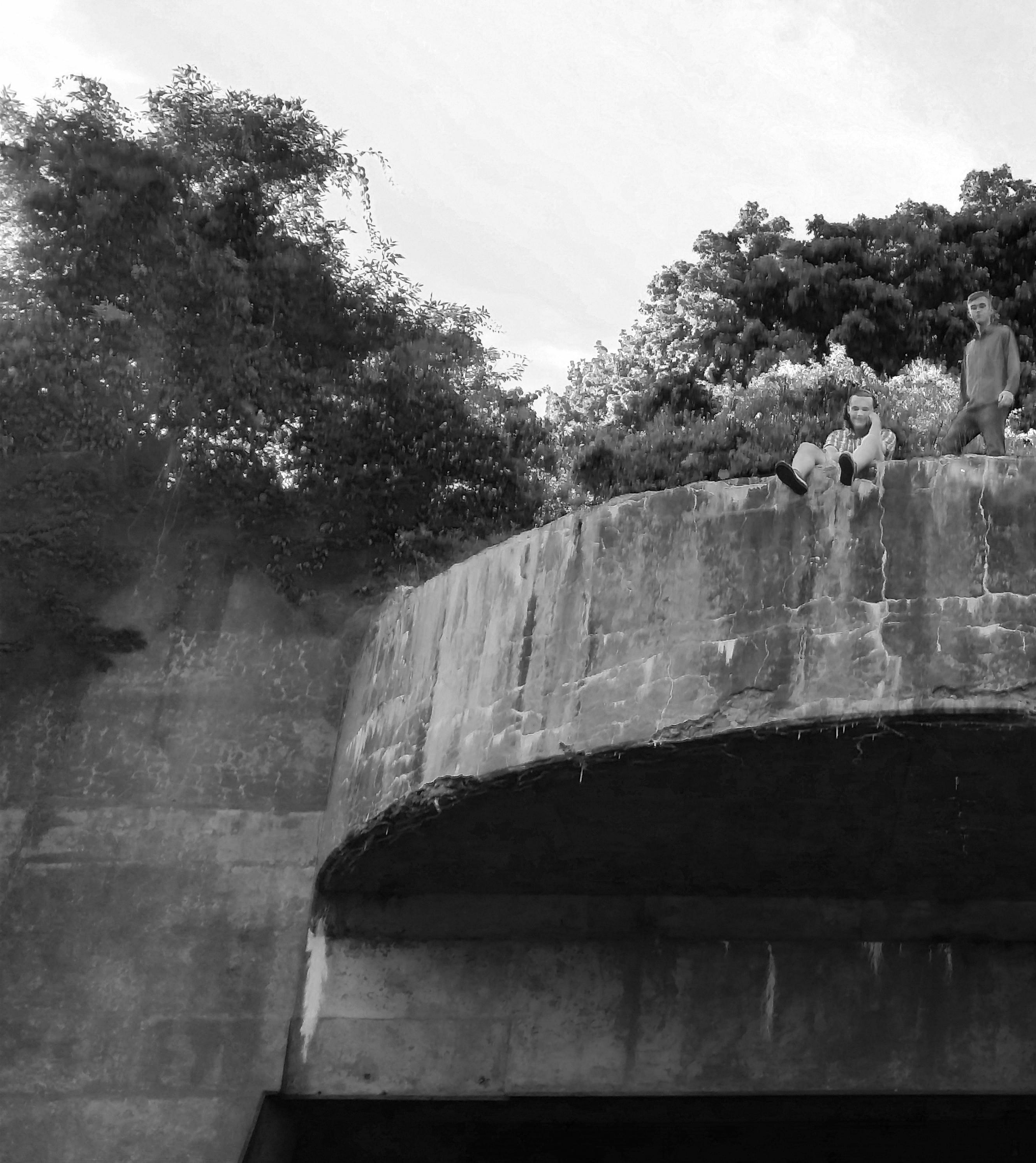
“Oh, okay,” the voice responded. Needless to say, we left as fast as possible.
Urban exploration, or urbex, is the act of exploring abandoned manmade structures. Like many of life’s joys, urbex is risky at best and illegal at worst. If you can get past the possibility of getting your ass kicked by a cop and fined for trespassing, you still have to take factors like squatters, structural instability, asbestos, and abnormally large bugs into account.
New England can be heaven for the urban explorer especially if you’re willing to search around a bit. There are fun easy places to explore that don’t require a ton of effort, along with multitudes of hidden gems around the seacoast. Urban exploring is something everyone should experience at least once in their life. The thrill of it isn’t like anything else out there. If you’re new to the game, here are eight pieces of advice to get you started.
There are few things scarier than being lost in an abandoned building and not knowing how to get out. It’s easier than you think to get turned around and confused, especially if it’s dark. You don’t have to leave a trail of breadcrumbs, but you should stay aware of your surroundings and consciously keep track of where you’ve been and where you’re going. If you do get lost, it’s not the end of the world. You can almost always call for help. It’ll be scary, but as long as you keep your composure and don’t run off in any random direction in a panic, you’ll eventu ally find your way out.
This is my personal nightmare, especially when exploring places with minimal of lighting. There are a million and one reasons why you definitely don’t want to be stumbling around in the dark in potentially dangerous place you hardly know. Be sides the obvious dangers of not having a flashlight like falling down or getting lost, it also takes away a lot of your freedom. It’s not as fun when you have to cling on to one of your friends who has one. You’re a strong independant urban explorer, not a moth.
Not only is it dangerous to go by yourself, it’s considerably less fun. You can’t show your friends the creepy doll you found in the cellar if you don’t have anyone with you. Plus if you hap pen to slip on a puddle in that cellar and break your legs, you won’t have the immediate help and comfort your companions would provide. If you’re willing to risk such a mess as being stuck in a cellar with both your legs broken and with only a creepy doll for company, or something akin to that situation, then by all means go it alone. If the thrill of exploring some place by yourself is what you’re looking for, I’d say scope the place out with a friend or two before you go solo or at least talk to someone who’s been there before about the layout of the building or house. Still, going with a few buddies is a signifi cantly safer option.
I shouldn’t even have to list this one. For the safety and con venience of yourself and others, please do not try to be a badass. Even if the other side of whatever unstable structure you’re thinking of crossing looks so neat, don’t forget to use your com mon sense. Walking across that rotting wooden beam or trying to squeeze between walls might seem like a cool idea in the moment, but trust me, it’s not. When you hear the wood start to splinter or you realize that you really can’t wiggle through to the next room, you will instantly regret your decision.
As long as you have your trusty flashlight, some sturdy exploring shoes and a reasonable expectation of your limita tions, you have very little to be scared of. It’s important to recognize your fears and try to address them logically and not let them ruin the experience for you. Urban exploration can definitely be spooky, but nine times out of ten there won’t be anything waiting for you in the dark besides a few centipedes and a couple spiders. If the centipedes and spiders themselves are mainly what you’re afraid of, well I don’t have much advice for that one. There are going to be at least some bugs anywhere you go. You can spray yourself with bug spray beforehand to give you a sense of protection, but ultimately you can take com fort in knowing that they’re more scared of you than you are of them. As someone with arachnophobia I always try to keep these thoughts in mind. Though it can become a bit difficult, especially once when I heard my friend call out “Woah! There’s a spider as big as my face back here!” Stay strong my arachnid fearing friends, they won’t bother you if you don’t bother them.
If you see a sign that says “No Trespassing” you should prob ably leave. Never break locks or try to get into a building or structure that doesn’t clearly have an opening. If you see signs, doors that have modern locks on them, or high fences, it’s not a smart idea to go in. Never bring spraypaint or obvious tools be cause if you do get stopped by police, a simple slap on the wrist could turn into a hefty fine or even jail time. Yikes.
If you’re deep into a building and you hear a voice or a loud noise that clearly was not from you or your friends, you should probably book it out of there. As much as I would personally like to believe that a loud bang or a gruff “who’s there?” is a spirit trying to say hello, chances are that it’s not. At best it’ll be another explorer, at worst it will be, well, I’ll let you decide that one for yourself. It’s more common to run into other ex plorers in more popular places, but if you and your friends are excited to go into a lesser known spot and you hear a noise or see blankets or bags of trash, just leave as soon as you possibly can. Learn from my mistakes.

This last and most important piece of advice speaks for itself. It’s courageous enough that you’re exploring to begin with, don’t put yourself and others in danger just to look cool. Hope fully the advice I’ve listed here is obvious enough that you’d do it anyway, but everyone needs a reminder. Keep these tips in mind and you should be good to go. Watch out for spiders and have fun!
5. Try not to be afraid of the dark, or bugs.
6. It’s not a ghost, it’s a person. Either way get out quickly.
7. If you think it’s illegal, it probably is.
8. Being an idiot is not the same as being brave.
- Lily Mangan
My first experience with bullying was when I was six years old. I remember the day it happened. I woke up early, as most little kids do, and put on my striped leggings and princess sweatshirt. I grabbed my backpack and hopped into the back of my mom’s mini van. I rode the seven minutes to school thinking about how great the day was going to be. In kindergarten we mostly just sat there and played games. Making school easy and fun. I had a good group of friends I had carried over from pre-school. On this day I learned about a miniscule version of what I would find out was bullying. The kids I was friends with suddenly started to ignore me and not let me play with them because I was “too loud” or “not cool enough.” Being excluded at such a young age makes you ask questions like “what did I do wrong?” or “why me?” I didn’t know at age six that I would experience something that would not only impact my life but the lives of many others around me, including people that I cared about.
Bullying is not like what they show in movies, at least not from my experience. It’s not cliques of girls saying rude things in the hallways or jocks pushing the scrawny kid into the locker. It’s much more subtle than that. According to www.bullyingstatistics. org, about one out of every four students (22%) report being bullied during the school year, but I bet if you asked students at Oyster River High School they would say that a lot of the bullying goes unnoticed.

ORHS is unlike other high schools in that the bullying that oc curs here is subtle. Gossiping behind people’s backs, commenting mean things online, and excluding people are just some of the ways I have noticed bullying occur here. A lot of the bullying I have wit nessed at ORHS isn’t one on one. What occurs more often than not is group bullying. As Kim Sekera, a counselor at ORHS states, “I’ll use the senior core as an example. Seniors have an affinity to wards that being ‘their’ space. Everybody has equal access to it, but nobody would ever enter it. That is almost like group bullying be cause it’s more like this feeling or essence of ‘don’t you dare enter.’”
In today’s society, bullying has been defined as an intentional, aggressive behavior directed at an individual who has come to be viewed by his or her peers as lesser, weaker, or unfavorable. It can consist of verbal, physical, or social aggression. Group bullying is different in the way that it allows a group to target an individual person or a group of people. I have noticed that when this is the type of bullying that occurs, it becomes harder for people to stand up for themselves, or other people, as they may be afraid of being targeted themselves.
During my three years of being at ORHS, I have noticed the im pact that group bullying or just bullying in general has on a person. I have had friends that have felt like they cannot walk through a cer tain hallway in fear of being targeted by a group or an individual. In an ideal situation, bullying of any sort would not occur. However, this isn’t possible. Bullying occurs in every single high school in the US. I think this is because when you mix students of different social backgrounds it is likely that they will not be as welcoming to each other as they should be.
After witnessing people being bullied for reasons out of their con trol, I first had to ask myself ‘why are people bullied?’ There’s no definitive science as to why people are bullied. Statistically speaking, some populations are more likely to become targets of bullies.
This leads me to my second question—Why do people bully? Growing up I was always told that people bully others because deep down they are insecure about themselves. Now that I am older I can definitely see the truth behind this statement. I don’t think that there are people out there that say to themselves “I’m going to be mean today,” but I do think people project their insecurities onto other peo ple. Bullying happens because you have people in power and people trying to figure out their identity. There are so many factors that play a role into why people bully it’s impossible to give one definitive answer.
This leads me to my third question—How do we stop it? According to the Center for Disease Control, students who experience bullying are at increased risk for poor school adjustment, sleep difficulties, anxiety, and depression. It’s clear the impact that bullying has on its victims. It has been an ongoing problem not only in our country but at our own high school.
Kim Sekera, a counselor at ORHS, says, “I think a lot of it can stem from empathy. I think focusing so much on empathy can really have that ripple effect. I’ve never met a student that says ‘I like to be mean.’ There’s nobody who would say ‘oh I don’t care if this happened to me.’ Nobody would like to be in that position.” Empathy is an important quality whether you are a bully or just a bystander.
Like I mentioned above, a lot of the bullying that occurs at ORHS is more subtle than you would think. In modern movies, bullying is portrayed as verbal and physical abuse. For example, you might see two people get in a fight or somebody say some thing insulting to another person. From what I have witnessed in over three years of high school, that is not what happens. A lot of the bullying that occurs at ORHS is starting rumors, cyberbullying peers or talking behind somebody’s back. Not to say that people don’t get in fights or verbal arguments, it is just rarer.
“A lot of bullying that happens is much more subtle. Social media is where a good chunk of bullying happens. The problem with that is that it’s really hard for the adults to know that it’s happening. That’s when we really rely on other students,” says Sekera.
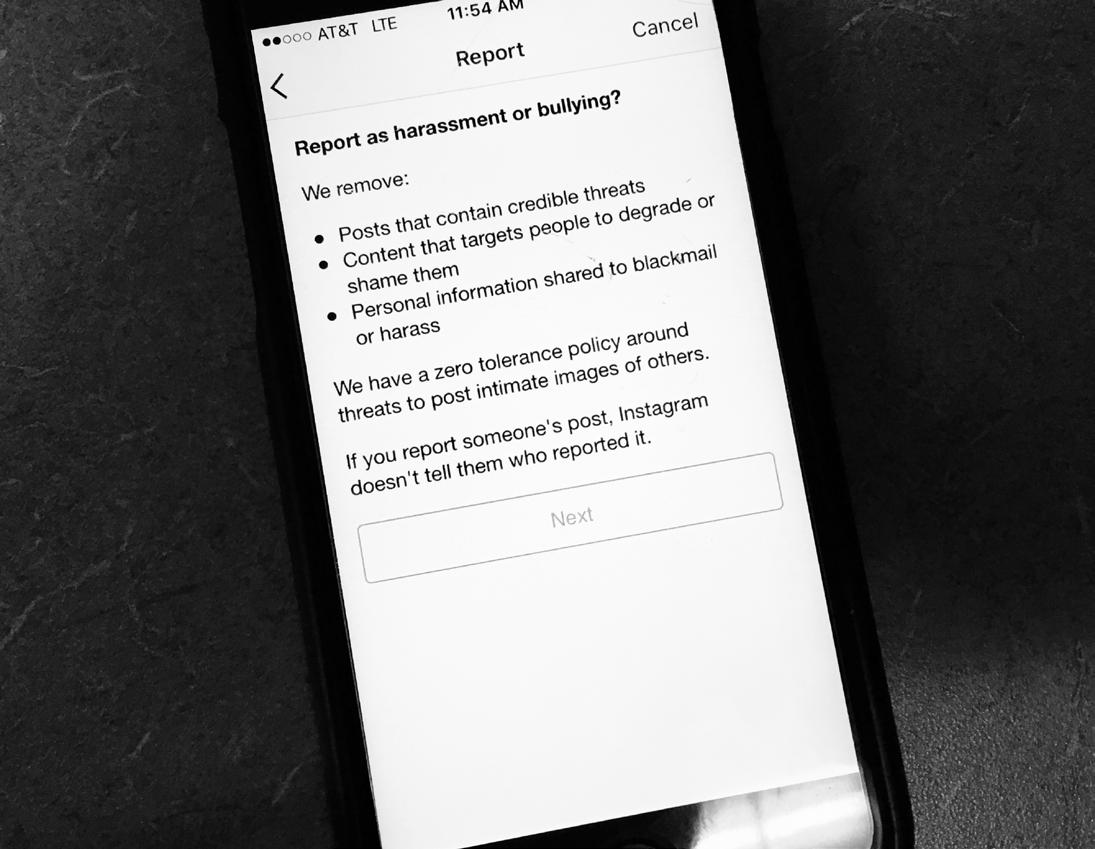
I’ve witnessed first hand what spreading rumors and post ing mean things on social media can do to a person and it isn’t something that anybody should have to go through. To the peo ple that are bullies: I do feel sorry for you. I believe that you are so insecure about your own self that you feel the need to lash out at other people. I hope that you will realize that what you are doing is hurting other people and it honestly isn’t worth it.
To all the bystanders: please stand up. I know sometimes it is easier said than done, but it really does make a difference. If you can prevent even just one person from being picked on it is worth it. If more people stood up to try and prevent bullying it would become so much less of a problem in our school. Be em pathetic as your actions can help more people than you think.
To the victims: stand up for yourself, don’t let what they are saying or doing define who you become. Talk to a friend, a teacher, or a parent about it.
Bullying is preventable. We don’t think of it that way because it is so prevalent in our society. We can stop the cycle now. Not next year or next month, but today.
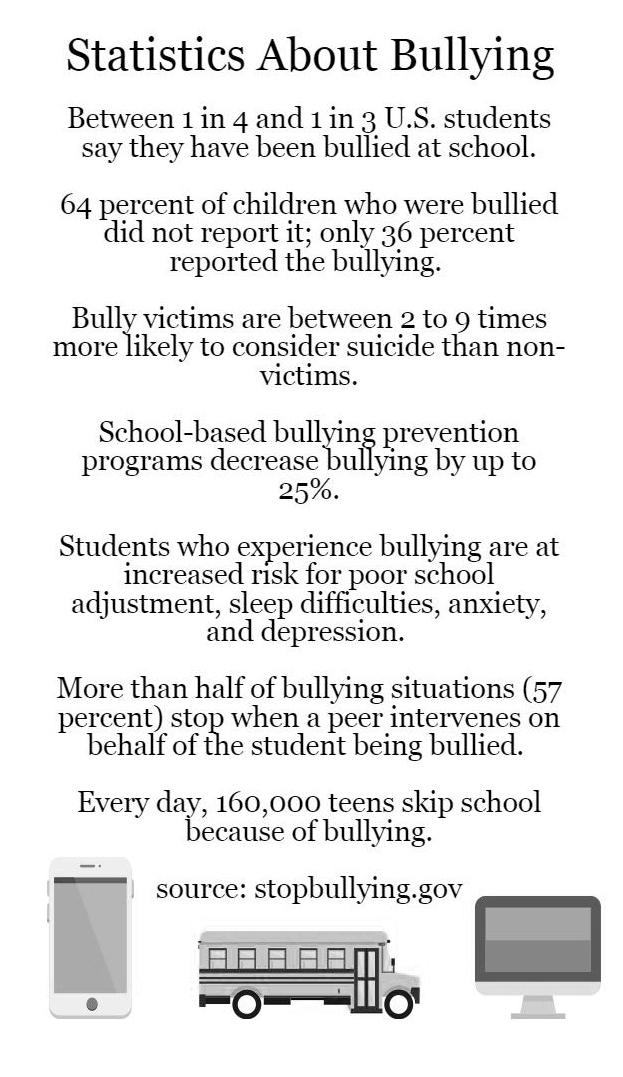
Iprobablydo not strike most people as one who hunts. I can’t say how many people have asked me “You’re a hunter?” I get it, the image of me in baggy camo and neon orange is not a very coherent one, but I do hunt, and I have killed animals. While ‘environmentalist hunter’ seems to be a contradictory phrase, there is not a better one to describe my relationship with nature.
Hunters often suffer from one of the worst stereotypes there are. Our societal image of a hunter has a neck that is roasted red, hands that are always filled with guns and Budweiser, and eyes that smolder with a distaste for life.
Oftentimes, our stereotypical hunter does not care for nature. This is wildly inaccurate. People like me do not kill for the sake of killing, and many have a deeper connection to nature than one would expect.
There are a variety of reasons to hunt. Top of my list, and this may surprise you, is animal cruelty. I came to terms with eating meat a while ago; I believe it is a natural thing, but this does not mean I think slaughterhouses are okay. The explicit breeding of animals with no other purpose other than their meat shows no regard for the animals as living, breathing creatures. They should not be subject to life in cramped rooms where they can’t even move because of the sheer density of other animals. Manipulative breeding of livestock has gone overboard to the point that oftentimes chickens grow so large they break their own legs with their weight.
If you get food from an animal that you hunted, I can guarantee that animal lived a better life than anything you can buy at the supermarket. Wild animals not only get to live longer, but they get to live more naturally.
Adam Hookway (‘17) got his hunting license when he turned 16 and his family has raised their own chickens, goats, and other animals. He agrees that because the animals weren’t food from birth, “chances are that the animal you hunted had a better life. It’s also not washed in ammonia. I think hunting is a lot better than contributing to large corporations, so they can corral animals into terrible lives,” he said.
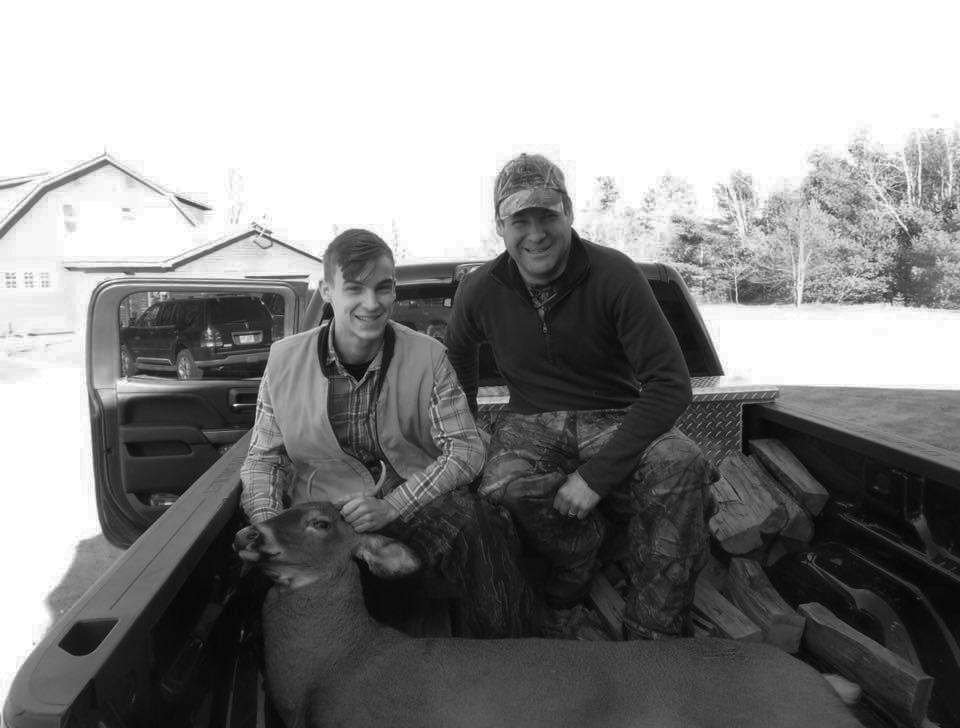
Another point Hookway raised is the health benefits that meat from wild animals have. It is not only lower in fat due to wild animals’ active nature, but is also higher in nutrients like Omega-3 Fatty Acids, Iron, and Zinc. Hunting can also make food so much more affordable for families. Thomas MacGown (‘19) learned to hunt from his father, and his family. About 35-40% of the meat he consumes every year comes from ani mals that his family hunted. “Hunting is financially amazing for my family,” he said. “Let’s take a deer for example. A 130-150 lb deer will give you around 75-85 lbs of meat. If that meat is priced at $5/lb, that means you get $425 worth of meat. This meat will last a good two to three months, depending on how much you eat.”
You’re probably still wondering why I call myself an environmen talist hunter. I’ve addressed the impact that hunting has on the environment would appear to be negative at first glance, but once one takes a closer look, one can see that it actu ally helps the environment. There have been a lot of im provements to regulation surrounding hunting that have made it sustainable and even beneficial for the environment.
First off, to take an animal, you have to buy a tag, which hovers around $30 per deer in New Hampshire. All of that mon ey goes to conservation programs; all of it. In fact, the US Fish and Wildlife Service reports that the majority of funding from state con servation programs comes from hunt ing and fishing licenses, about $200 million every year. That’s a lot, and it all goes to things like purchasing a habitat for animals that are running out of forest due
“
I think hunting is a lot better than contributing to large corporations, so they can corral animals into terrible lives.
”
to human development or even search and rescue missions. A huge number of hunters are also conservationists, myself included. Nature needs to be preserved so that humanity and all other life can enjoy it. Wayne Vetter was the Executive Director of New Hampshire Fish and Game from 1997 to 2003. He is retired now, but still hunts and fishes. “Well needless to say, for animals to thrive and do well, they have to have a habitat to live in. With all the housing developments and commercial construction, wild game has been driven into small woods close to houses, have a habitat to live in. With all the housing developments and commercial construction, wild game has been driven into small woods close to houses,” said Vetter.
Another great aspect of the tag system is that the number of tags available every year is limited by Fish and Game to match the population size of the year. This ensures the species is not over hunted, and that the species does not overpopulate. “When overpopulation occurs in a small area because of development and lack of population control, the animals can become in conflict with humans. In Connecticut, they have a huge lyme disease problem right now because the deer populations are huge in small spaces, causing the lyme to spread between deer which are dropping all sorts of deer ticks,” said Vetter. Perhaps the simplest reason that I hunt is just to get out in nature. When you’re still and silent in the woods, you feel like you’ve been absorbed by something larger than yourself, like you are a part of the forest. Squirrels will come right up to your feet, birds will flutter near to your face, and the trees will yawn over you as wind bends their boughs.
Once when I was hunting for deer with my dad, I looked down this cut of woods and straight into the eyes of a bobcat. It stared at us and watched us cross the path. It didn’t run, it just observed. To feel as at one with the natural order of things as I did in that moment is something I could not replicate by just going on a stroll through my woods- I know I’d be too loud for one thing.
This is something that I think every hunter feels. Oneness with the natural world is very apparent when you are quiet and alone with forest life. “Whenever I’m in the woods I become alive. I’m able to use all my senses. In the morning, when the sun starts to rise I’m able to hear the acorns start to fall and the birds start to call. I call this the forest coming to life, and it’s probably one of the best [moments] you can encounter,” said MacGown.
When you see an animal in the woods with no other human influences, you gain respect for it. The best thing one can get from hunting is respect for the animals that one eats. If you are a meat eater, my recommendation to you is to purchase meat that was hunted or was raised locally in liveable conditions. I can’t recommend that everyone should hunt, but please find some way to understand that meat comes from living animals. It will give you a great deal of re spect for nature. - George
Philbrick
Whenever I’m in the woods I become alive.
Golden morning sunlight crests the horizon over a dim silhouette of a mountain ridge and gently lifts your eyelids open. You unzip your sleeping bag and stretch out your stiff limbs with a yawn - your hand accidentally knocks a pan off of its hook, breaking the delicate silence as it clatters loudly to the floor. You throw on an old flannel whose appearance and smell give the impression that it was pickled and put in a blender. Grabbing an old newspaper, some small logs, and a match from underneath your bed, you turn to the woodstove directly to your left and get to work boiling some water for morning coffee. With the pot on the stove, you slide out of your sleeping bag and take a seat in front of your tiny desk a foot away. A yellowish laminated map sits on the corner of the desk, which you grab and proceed to fold open. Taking out a felt pen, you plan a route in whatever direction your heart desires.
No, you’re not stuck in a log cabin made for smurfs - you’re living the van life.
The idea of travelling cross country and living out of a camper has been around for as long as vans have been around. However, with the advent of social media, every free spirit from the Appalachians to Anaheim has dis covered the magical way of life, and many have chosen to answer the call to the wild side. Sites such as ‘van-life.net’ and ‘campervanlife.com’ offer en thusiasts a place to congregate with other people who share the same ide als, in order to host group-sponsored meetups, exchange advice and in formation, or simply browse others’ adventures. One of Oyster River’s own has become an enthusiast; senior Aidan Yoder is now the proud own er of a 1984 Volkswagen Westfalia, and he plans to convert it into a home.
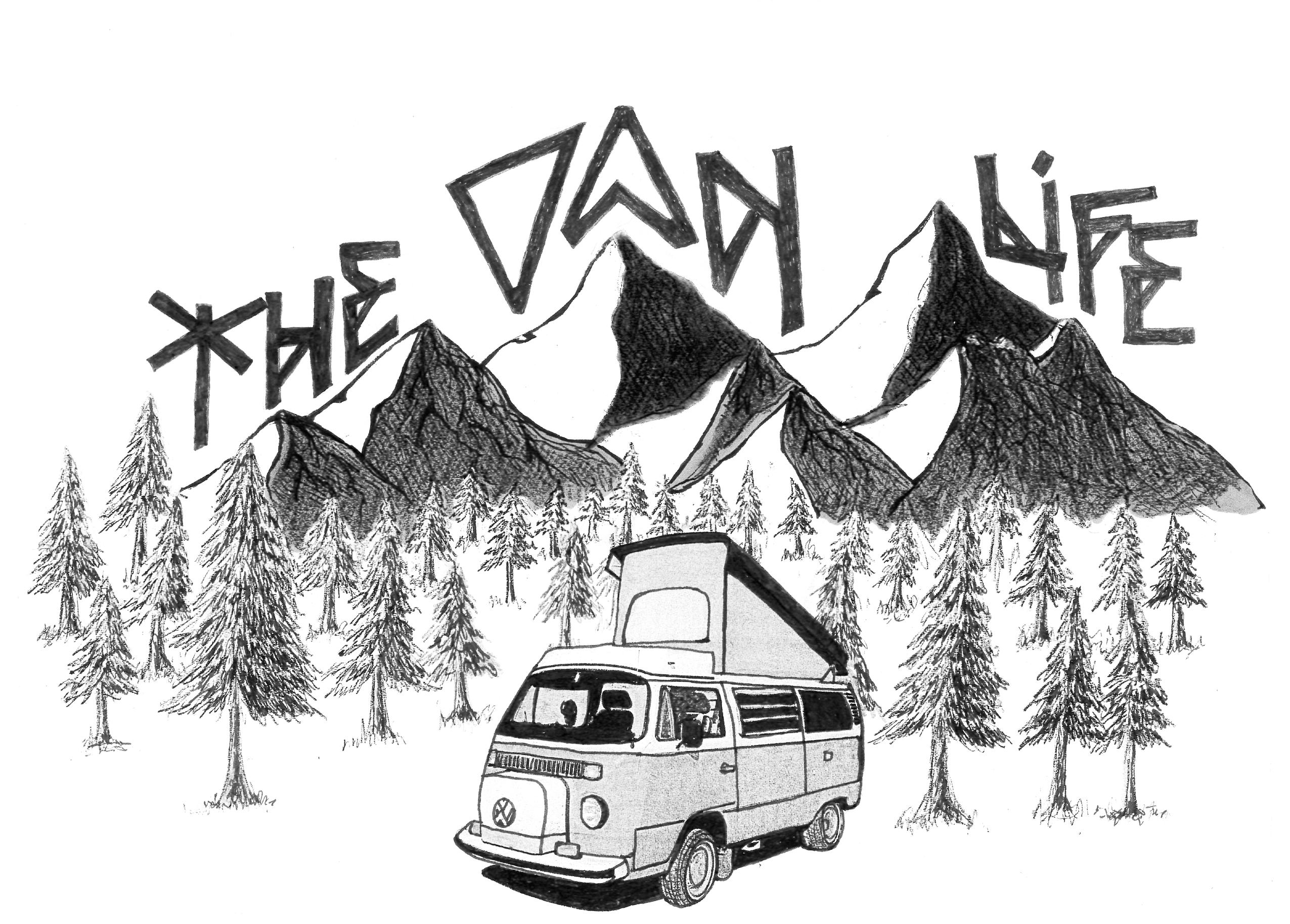
Yoder’s camper came from Connecticut - the original owner had bought it when it first came out, and took it on adventures all over the country. In its lifetime, the camper served to traverse the Appalachian trail from Georgia to Maine, and be the center of family, and personal, outings for decades. Unfortunately, the van stopped working properly in its older age and the owner did not have time to attend to it. It sat outside under a tarp for a few years until Yoder’s grandfather discov ered it, and when he did, he knew it would be the perfect van for his grandson. However, the owner was reluctant to sell his old friend. After seven months of thinking, he figured the Yoders were the right people to own the van. He liked their story, and he knew that they would take great care of it. He sold it to the family for a great price, and they got to work fixing it up. They replaced almost all of the interior, did some engine work, and gave it a brand new paint job. Yoder has taken it for test drives and overnight outings, but he has yet to make the trip up to New Hampshire to finally take it home. He hopes to accomplish that this coming spring, so that he can take it wherever he wants in the summer.

Many are attracted by the simplicity of the lifestyle - sure, you may not earn an extravagant amount of money, and you may have to take baths in gas station sinks more times than you’d care to mention. However, you get to live a life that is virtually free of stress, and filled with amazing life experiences. Employees are lucky if they get two or three weeks of vacation a year - if you’re in a van, every day is a vacation, especially if you can work from “home”.
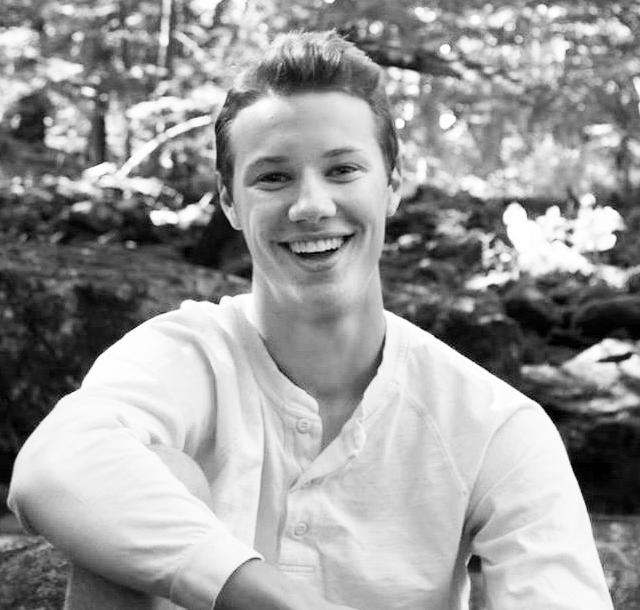
“Another big part of it for me was the connection with nature that you get from living like this. I’ve always liked being surrounded by nature so this seemed like the perfect way to do it,” states Yoder.
Driving a van means you can go wherever the road takes you, and sometimes even where the road doesn’t. Having the ability to park your mobile house in whatever spot in nature you desire can create a better connection with the natural world around you, because you almost be come a part of it. There are no televisions or internet to keep you en tertained, no household appliances to wash your clothes or cook your dinner, and no sturdy walls to separate you from the outside world. Essentially, you’re in a tin can with windows in the middle of the wil derness with likely no other people for miles around. However, that’s just what these people are in search of - The absence of all of these common amenities lets the adventurer become “unplugged” from the daily grind, and lets them tune in to the natural world around them.

“It’s always been a dream of mine to own a van... I just really want to live that minimalistic life where I can enjoy myself, enjoy what I’m doing, and enjoy adventures along the way.”
Dillon Patterson, an alum of Dover High School, started his adventure for this same reason three years ago. Patterson is an avid climber, and he wanted to spend all of his free time doing what he loved outdoors. He has travelled to many noteworthy climbing destinations during his time on the road, including Joshua Tree National Park in California; Bishop, California; and Fort Collins, Colorado.
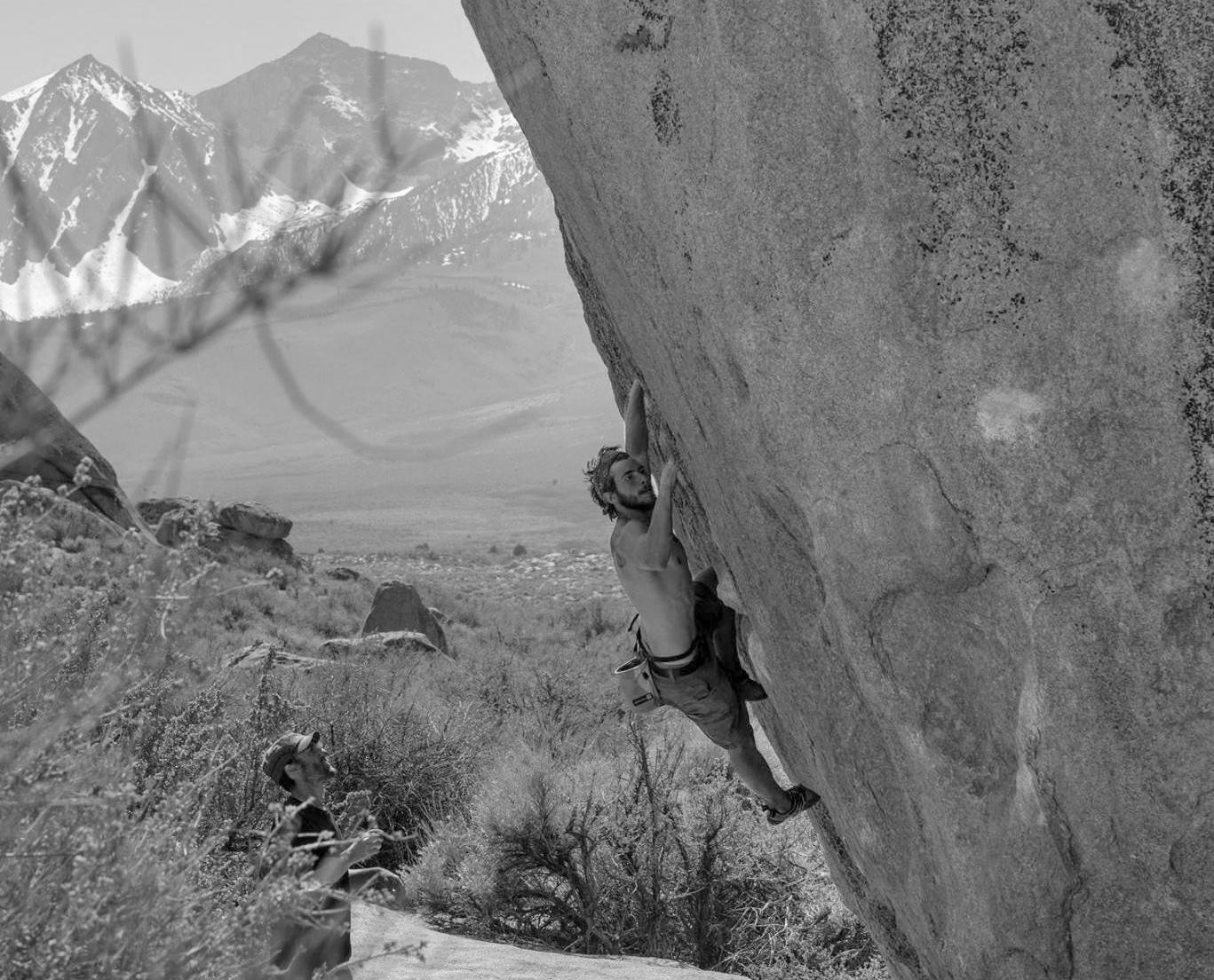

Patterson currently lives out of a GMC Savana Cargo van that he’s souped up to meet his living needs - his accoutrements include insulation in the entire sleeping area so he can stay warm on cold nights, and a bed custom built to fit the back. However, his passion wagon wasn’t always this high-tech.
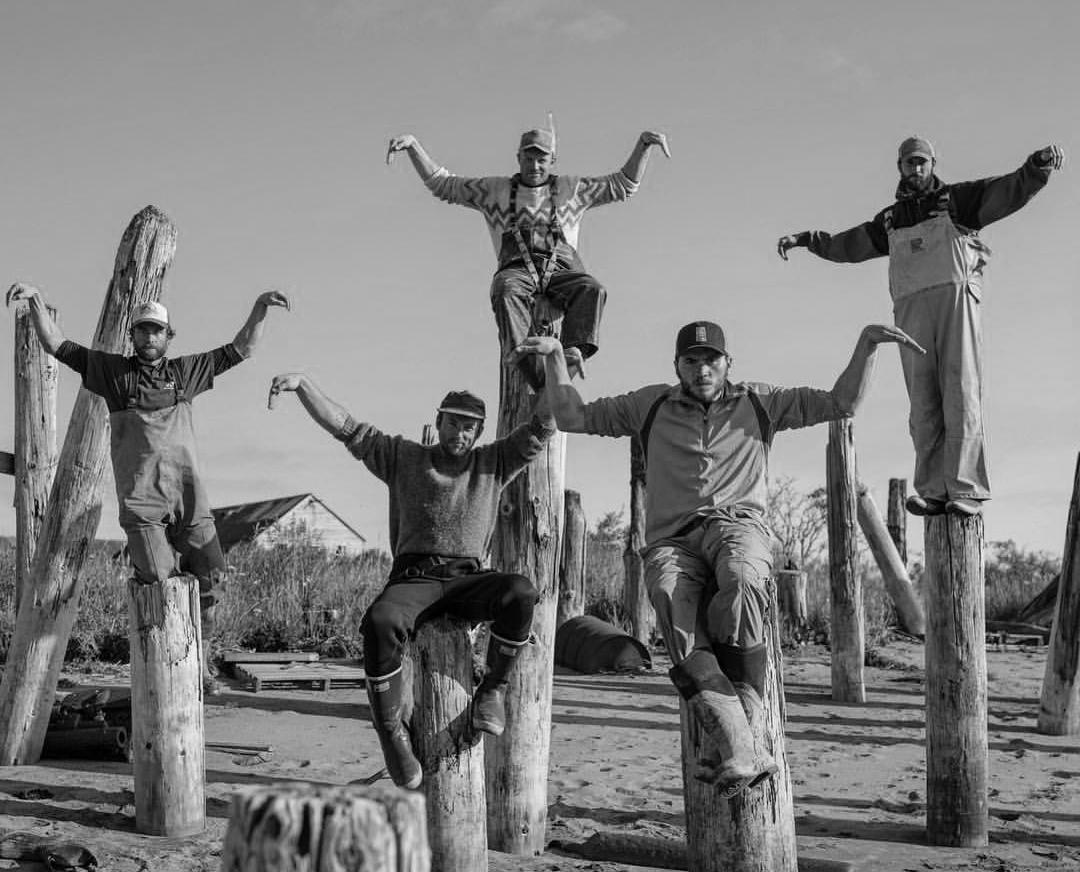
“The first year I went out, I lived out of my Saab 9-3 Convertible two-door coupe, and that pretty much sucked. That leaked a lot, and it was really cold.”
Patterson then went on to own his first van, which went by the name of “The Yellow Submarine.” He stayed for an extensive time in Joshua Tree National Park, switching parking spots with other van owners because of the 30 day parking limit.
“I eventually got caught for staying longer than I should have, and they had to make an example out of me. They surrounded the whole campground with rangers, and everybody that I was with ducked behind rocks so that it was only me in the campground... They were all just watching me get yelled at by these rangers. Then they kicked me out and gave me two huge fines... It was pretty hilarious,” he says. That didn’t stop him from continuing to climb, though - “I parked my van in town and lived in a cave for two weeks so that I could keep climbing,” he said through a smile.
Patterson recognizes many of the perks of living the lifestyle that he does. “Not having to pay rent is a huge savings for me every month. It’s super cheap to live in a van.” In total, he spent about $4000 on his new van - he bought it for $3000, and put another grand into it to make it livable. He has a cooler, because he “eats a lot of food,” and he definitely does not have a two-burner propane stove hooked up to a full-size propane tank, because “you’re not sup posed to have one of those” - instead, his stove is powered by the sun. In all though, he says that his favorite thing by far is “being able to drive down the road and just pull over wherever I want and I can sleep there for the night... You can park in a spot and watch the sunset with the mountains behind it, and then wake up there and watch the sunrise. Then you can drive down the road a little ways and end up at the base of the best bouldering field in the world. It’s really awesome.”
However, every sunny day has a few clouds, and the van life is no exceptionthere are some drawbacks to living life on the road.
Patterson says that one drawback of sleeping in a van is the cold - even with the extensive insulation that he has, it still can drop to uncomfortable temperatures at night in the winter. “The worst part, I’d say, is not always hav ing an adequate bathroom situation in the van. My girlfriend gets pretty upset with that when she comes to stay with me,” explains Patterson. Enough said. Aside from these small exceptions, Patterson says that he loves the van life as a whole. “I would highly recommend it to anyone that’s looking to skip a year, or just plain old become a vagabond.” Patterson is surprisingly expe rienced and knowledgeable for his age - at only 20 years old, he comes off as having the wisdom of somebody who has lived outdoors for decades. He agrees that living the lifestyle that he does has helped him mature and develop a sense of individualism that not many his age possess. When you have to do everything for yourself, it’s pretty much a sink or swim operation.
Whether you’re a high schooler looking for something fun to do during your summer off from school, or an adult who wants to get away from the modern world for a while, the van life has offered thrillseekers of the past and present a way to experience life like no other - and most likely, it will still be around for the wayfarers of your great grandchildren’s generation. If a burn ing sunrise over the Pacific ocean or a brilliant display of stars hung over the quiet Mojave desert sound like your kind of destination, you may want to do some research for yourself. Who knows? In a few months’ time you could find yourself chugging along to wherever your heart desires in your new camper, with poor hygiene, no technology, and limited luxuries, having the time of your life.
- Thomas Cote“It was this loud roaring noise followed by this eerie whis tling noise. I could vaguely hear something like screaming, and every once in awhile some heavy debris slammed up against my apartment, or some screens on my windows would fall off. It was like a sensory overload, way too much was happening at the same time,” says Jenna Howland, Oyster River High School alumna (‘16) as she found herself caught in the middle of the most powerful hurricanes the caribbean has seen in a decade.
In the spring of 2016 Howland vol unteered to go to Haiti to help out with Youth Development and Art through the Haitian Health Foundation (HHF). How lands mother, Janet Perkins goes semian nually to Haiti with the HHF organiza tion. This sparked Howland’s interest to help out.
HHF focuses on the health and well-be ing of Haitians by working with health care, education and community develop ment. However, Howland’s experience in Haiti took a twist when she was stuck in the heart of a Category 4 hurricane Octo ber of 2016.

During Howland’s freshman year of high school, she raised money with ORHS alumna Arabella Reece (‘16) for HHF as their Power of One project. Reece and Howland then travelled to Haiti with Howland’s mother during their sophomore year to complete their project. Not only did she raise money and volunteer for the organization, but she be gan to learn Creole, the official language of Haiti, so that she could communicate with locals while she was there.
It wasn’t long into her trip to Haiti when Howlands fo cus changed and she began a life changing experience. She watched as the buildings, trees and the community around her came crashing down.
“I was completely occupied with disaster relief. I helped clear roads of all the trees and put together kits filled with food, water purification, and clothing,” says Howland. “I had dreams about the wind for days after, it was so weird. My apartment felt like it was shaking and I actually ended up putting on a raincoat once it started to flood. It was so loud that I couldn’t focus on anything.”
After the hurricane, all communication was lost with her family back home and it was three weeks before they heard anything. Friends and family began to worry and were desperate for any contact.
“It was kind of strange because we are used to being in touch with people virtu ally immediately so I was trying not to worry about her because we knew that the communication lines were going to be down,” says Howland’s mother. “Even though I thought she was okay I heard these reports on the news of 80% of the homes in her area were destroyed and thought ‘oh my gosh!’ One night I got just a short text saying she’s okay so that was the best news I’ve ever had.”
Howland returned to the United States Friday, November 18th after a long and life changing expe rience but with a great story to tell.
“I don’t know many people who could get caught up in the hurricane and be on the front lines helping people at such a young age. She’s honestly wise beyond her years and really capable of trying to understand other perspectives and life styles,” says Elizabeth Bulkley, ORHS alumna (‘16).
Howland will be attending Alfred University in Alfred, New York, in the Fall of 2017 where she will be studying fine arts. Howland’s passion for art and helping others brought her to Haiti, and will continue to be a main drive in her future endeavors.
“Basically I was just on edge the entire time and I was praying it would end soon.”
When Sarah Corrow was a freshman at ORHS, she recalls feeling what the majority of us felt - scared to be ourselves. “I was terrified to wear the kind of clothes I wanted to because I thought people might make fun of me,” says Corrow who later goes on to say “As a freshmen in a classroom filled with upperclassmen I would always be very careful about what I said. I just wanted them to like me.”
These feelings didn’t last long as now Corrow can proudly say that she thinks, “one of the most important things I have learned is how to respect myself. When I was a freshman, I would have said or done anything for people to like me or to fit in. I would allow people to make fun of me because I didn’t want to be a snitch or be labeled as not being able to take a joke. Through my four years I have learned how to stick up for myself, and to love me for ME - not for anyone else.”
Dominic Mattioni Victoria MadoreWhen Dominic Mattioni was a freshman at ORHS, he hadn’t discovered yet that school is what matters most. “I was focusing less on school work and more on basketball. I noticed some of the grades were dropping and I knew the grades had to be picked up. This experience made me HAVE to realize that school is what really matters the most,” says Mattioni.
While reflecting on his time at ORHS and realizing that it will soon be coming to a close, Mattioni expresses ,“I want to remembered for my kindness and being a good friend to others.” If he could thank anyone for helping him grow into the person that he is now, it would be his friends, teachers, coaches, and the senior class, mentioning that the senior class is a “great group of people that I will never forget.”
When Victoria Madore was a freshman, she didn’t attend ORHS. Madore moved here from Connecticut for her junior year of high school. “I used to stress over the littlest things, such as if I had the same lunch time as all of my friends, or whether or not someone is mad at me. Four years later, I have learned to accept that some things are out of my control and aren’t worth stressing over.”


While she hasn’t been in ORHS for the past four years like most others, Madore has valuable lessons to take away from here saying: “ORHS has taught me responsibility. Here, I am given much more freedom, but with an abuse of freedom comes consequences that are less than desir able. To avoid these consequences, I have learned to be responsible and act like a young adult.”
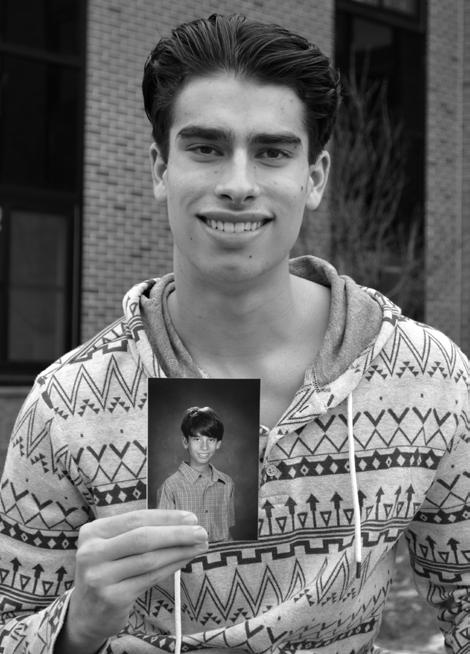
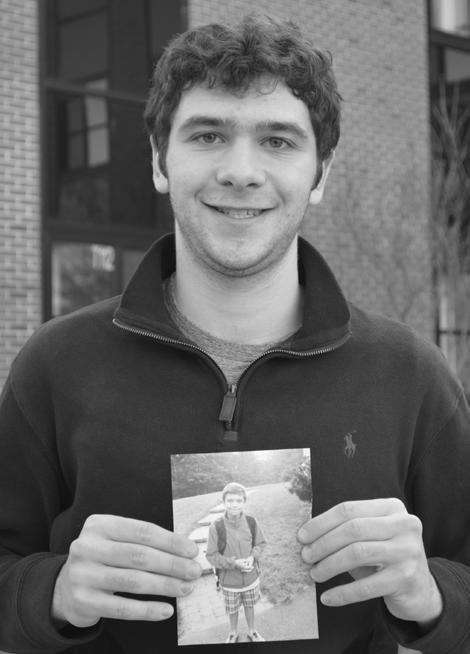
When Leo Foulds was a freshman at ORHS, he was experiencing a huge transition being a new student from Barrington. “ I was definitely intimidated. I remember trying my best just to try and stay under the radar that first year by sticking with the other kids from Barrington who were going through the same transition as me. By doing this, you could say I was able to learn the ropes and begin to venture out on my own.”
This wasn’t easy, but getting involved in activities through ORHS helped Foulds grow in dependent and confident. “Playing lacrosse in the spring gave me a great opportunity to be friend some of the upperclassmen,” says Foulds, who goes on to say that “every year since, I’ve noticed a change in my mentality, more drive, more confidence, and more self aware ness. Now as a senior, I look back and realize just how far I’ve come from that first day to now. Preparing for college, I truly feel like I am becoming my own independent young adult.”
When Abigail Bernard-Dollar was a freshman at ORHS, she had similar feelings to Corrow. “All I cared about was what other people thought of me. I felt I had to meet certain standards of beauty, and if I didn’t people wouldn’t like me. I was scared of losing my friends and not having fun, when I should have been focused on school,” says Bernard-Dollar, who has now grown confident in herself and aware of her priorities.
When Bernard-Dollar moved to the ORCSD school district, one aspect that was most unique was her connections with teachers that she didn’t have at her old school. “There are several important teachers out there to me and I wouldn’t have been able to get this far without them. If you are struggling, you need to know that your teachers have your back too; do not be afraid to ask for help,” says Bernard-Dollar.
When Liam McNamara was a freshman at ORHS, he hadn’t quite developed the social skills he wanted yet. “I was pretty weird and didn’t really have many friends but then people became more open and this made it a lot more easy to interact them. I was able to build up my sociabil ity skills so well that now I don’t really have any difficulty in making friends which is helpful since I know this is bound to help me later in life.” McNamara also described how during high school he has learned what his priorities are and that it’s not healthy to stress about everything.
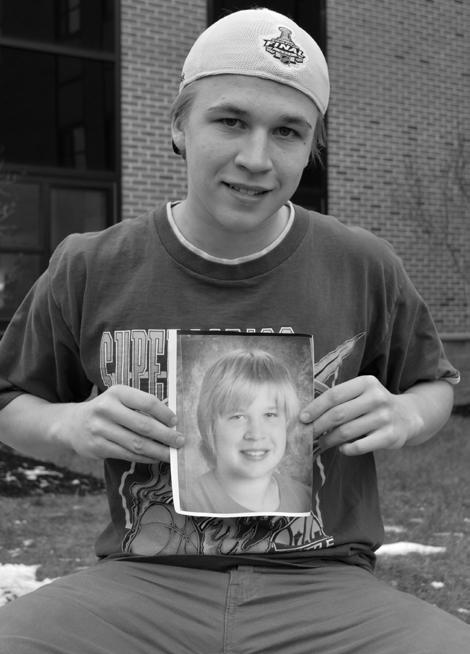
“I want to be remembered as the best tendy [goalie] in the history of the hockey team” says McNamara.
When Rose Mroczka was a freshman, she hadn’t grown to her potential as a student, team mate and athlete, but playing junior ice hockey for the Boston Shamrocks changed this all for her. “During the last three years. I’ve driven to Massachusetts and back every day for practice/workouts, often getting home at 11:30 at night (and spending around 3 hours in the car every day), [and] I’ve traveled all across the continent [for hockey],” says Mroczka.
Now, as a senior, Mroczka can proudly say that, “this whole experience has made me a better teammate, athlete, and student. I’ve learned to be more focused and driven in the classroom and at the rink, I’ve learned to manage my time by doing HW in the car or on bus rides, and from my teammates I’ve learned to be optimistic, dependable, and kind.”
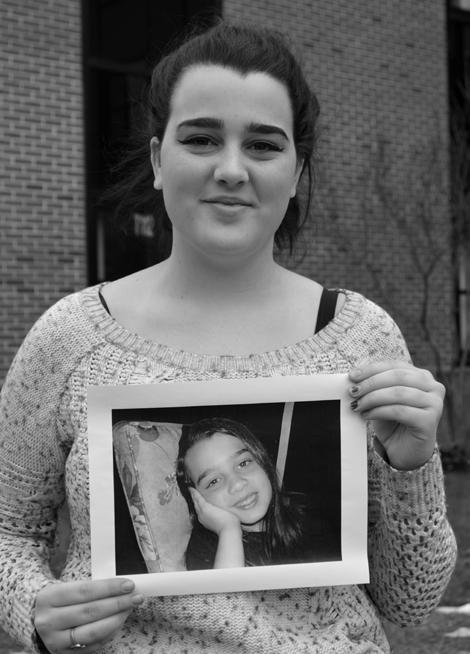
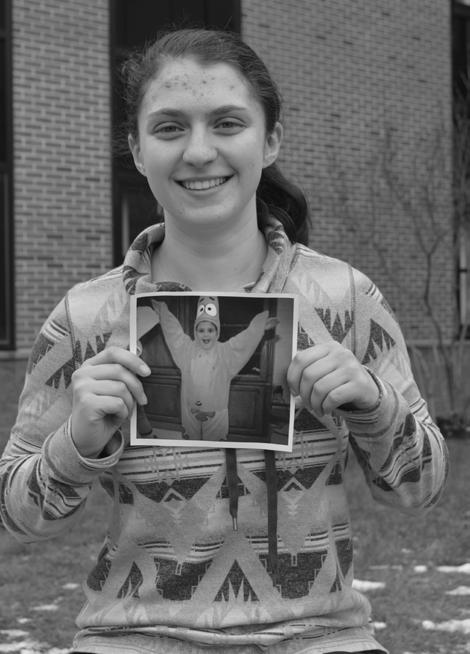
When Molly Downey was a freshman at ORHS, she was coping with depression and anxiety but throughout the past four years she has persevered. “I’ve learned how to be happier and realize that not every day is a good one and that I have to be happy for myself. I had to teach myself the importance of living and how my absence would not only affect me but people who love me,” says Downey, who recalls that freshman year she was “never able to see that people loved me.”
Today Downey is ready to take on the next step of her life: college. “I sit here today proud of myself for submitting 8 college applications and being recruited to play lacrosse for two Division II schools. I want to be remembered [at ORHS] as someone who worked extremely hard,” says Downey.
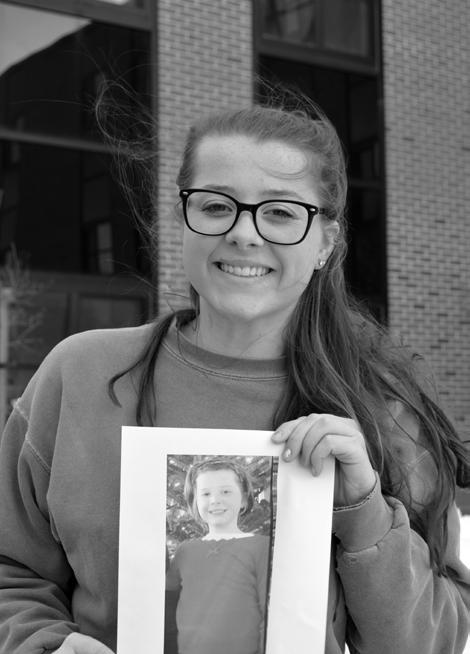
was what you might say a quintessential nerd at Oys terRiver High School” said Ethan Gilsdorf, thinking back on his teenage years. Now fifty, Gilsdorf is an ex tremely accomplished writer, critic, and speaker, and still a self-proclaimed geek and nerd. From writing for America’s top newspapers and magazines, to publishing his own award-winning books, to founding a charitable organization, Gils dorf has no reason to be ashamed of his life as a nerd.
Gilsdorf, who graduated from ORHS in 1984, had a uniquely dif ficult childhood. A “shy” and “introverted” kid, Gilsdorf faced var ious challenges as his father was not present in his life and in high school his mother suffered a devastating traumatic brain injury. Of all things, it was a fantasy role-playing board game called Dungeons & Dragons , that changed his life. “I found [my] group of friends through Dungeons & Dragons ” he said. “Once I found my group of friends, which took a little while, I felt more secure in myself.” His experience with this game and group of friends inspired him to write his first published book, Fantasy Freaks and Gaming Geeks, in 2009.
A foreshadow into his creative career, Gilsdorf and his friends cre ated a silent film on Dungeons & Dragons for a high school project in 1981. “While I was shy I was also a solid student, and in many ways the projects, the term papers, the creativity helped center me,” he said. “ I think I escaped into academics as much as I did fantasy worlds of role-playing games.”
Gilsdorf notes that he and his friends spent much of their free time at school making videos in a small back room in the library with video equipment given to them by Paul Gasowski, who taught En glish and media studies. “Gasowski and [history teacher] Alex Herlihy were extremely kind to me, and recognized that I think I needed to engage creatively in order to survive at ORHS” he added.
Gilsdorf credits ORHS with playing a large role in his personal and career development, however, it was far from perfect. “I think as far as high schools go, ORHS seemed pretty liberal and open-minded,” he said. “Of course there were lots of kids with lots of different ideas and there were social cliques of jocks and nerds and freaks, and working class kids, and kids who came from farms, and kids who were col lege-bound and those going to the vocational tech school. There was still, I think, a lot of ignorance and homophobia.”
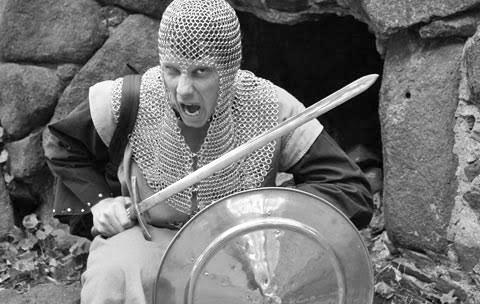
In his senior year, Gilsdorf says he began to “come out of his shell” as he played the lead in the school play and became more outgo ing. His creative potential was unlimited, but after graduating from Oyster River he had difficulty finding exactly what to do with it. After graduating from Hampshire College in Amherst, Massachu setts with a Bachelor of Arts degree and later a Master of Fine Arts
degree at Lou isiana State University, Gilsdorf had trouble devel oping his ca reer. “As far as my career as a writer and gaming nerd, it took a while to figure out how to make a living that way,” he said. “It wasn't until I was around 33 years old that I took the big leap to take myself more seriously as a writer.”
At this point, he moved to France for five years, and began to write for publications like The Boston Globe and The Washington Post . While freelancing, Gilsdorf also began to teach, and publish essays and poems. He has done a variety of writing, from articles about video games and live action role playing (LARPing), to more serious and emotional life stories. Many of his works of writing have been about interests he’s had since his childhood. “Some of my early interest in rediscovering fantasy and games happened around the time the Lord of the Rings movies came out in the early 2000s” he said, “and this eventually lead to articles on this subject and then my book Fantasy Freaks and Gam ing Geeks.”
Published in 2009, Fantasy Freaks and Gaming Geeks: An Epic Quest for Reality Among Role Play ers, Online Gamers, and Other Dwellers of Imaginary Realm , bounces around and touches upon various aspects of ‘fantasy and gaming subcultures’ through memoir. Trevor Garman teaches a Science Fiction literature class at Oyster River High School, and has a whole unit of his class dedicated to the book. “I was looking to expand the Sci-Fi curriculum and a unit on culture, and this book fit well,” said Garman “He has an engaging voice, a very accessible style, and I also like the fact that he was an Oyster River student. It wasn’t a popular topic [for authors] to delve into, so it’s pretty neat that he did.” The book received strong reviews from a number of notable Newspapers, and was dubbed a ‘must-read’ by the Massachusetts Book Awards.
The Lee native now lives in Providence, RI. His writing cont nues to appear in a variety of a America’s top magazines. As of now, much of his work is reviewing books for The Boston Globe and New York Times. Gilsdorf is also a co-found of GrubStreet Inc.’s Young Adult Writers Program (YAWP) which encourages teenagers to channel their passion for writing. With GrubStreer, he also teaches creative writing to teens who were similar to him, when he was in high school.

-Zach Leichtman
“I found [my] group of friends through ‘Dungeons & Dragons’.”
 Gender Dysphoria: a condition where a person experiences discomfort or distress because there’s a mismatch between their biological sex and gender identity.
Gender Dysphoria: a condition where a person experiences discomfort or distress because there’s a mismatch between their biological sex and gender identity.
Nathan Limric is a senior at ORHS who has fought for who he wants to be, despite the challenges he has faced. Nathan used to be known as Anna, though this never felt right. Here’s his journey, from Anna to Nathan, and how he has embraced his true self.
“It’s always one of those things that you know; just like people say about being gay. You always know, you just don’t always have a word to describe it,” says Limric. “It’s like a sense you feel that something’s not aligning.” As a child, Limric was in a constant battle with himself: a battle of not wanting to disappoint anyone while still being able to be who he wanted to be.
In elementary school, Limric only ever had guy friends. “I was always labeled as a tomboy, which didn’t bother me.” Limric hung out with a group of boys and was accepted by them almost as “one of the guys.” Limric ex plained that the way he dressed has always been a big topic of conversation. “It did bother me when they asked me why I dressed like a boy. How was I supposed to know? I was like six... It’s just what I liked to wear,” adds Lim ric. Limric’s classmates would often ask why he was wearing boy clothes because he was a girl. Questions like these did not upset Limric, just con fused him. “It was hard because I just didn’t have the answers.”
Later in elementary school, Limric joined the girl’s soccer team because it was what the majority of the girls did. Even though they were all team mates, none of the other girls accepted Limric. “None of them liked me. I felt very segregated. Even when doing warmups, I was always the back of the pack,” he says.
When Limric entered middle school, he worked hard to find girl friends that accepted him and still worked to fit into what society expected of him. “When I hit middle school, I felt the pressure to wear girl clothes and blend in,” says Limric.
Most of middle school was good for Limric. He had a group of friends that really liked him, but he still felt uncomfortable in the clothes he had to wear. “Eighth grade I wore pajamas the entire year. I didn’t know what to wear that I wasn’t going to get made fun of for. The pajamas were my defense mechanism,” he adds.
As Limric started to become friends with more girls, he began to realize more and more that he wasn’t like them. “They would always want to put makeup on me because that’s what they all did. I never wanted it and I didn’t know why. It wasn’t like I was trying to reject my femininity, I just didn’t want to wear it,” Limric adds.
Middle school is a time where everyone is trying to find their way and define who they are. For Limric, this was an even bigger challenge. Fortu nately, Limric’s parents have always been very supportive and understand ing of him. “My parents have always just let me do my own thing and be my own person, which is great. I know some parents are a lot more structured when it comes to what they can and cannot do.” Limric is very grateful to have such supportive parents in his life.
“When I entered high school I was really excited. I told myself: ‘time to stop wearing pajamas every day and wear the clothes you wanna wear!’” Limric started wearing the most masculine girl clothes he could find: lots of button up shirts, jeans, boots, and his favorite Bruins snapback hat. This style worked well for Limric and it’s what he wore most of his freshman and sophomore years. Limric didn’t get questioned as much in high school on his wardrobe, but he did get questioned about other parts of clothing.
“The undergarment thing was always uncomfortable, but it’s never some thing people talk about. I always got judged for wearing sports bras. I never understood why. They’re comfortable! Even as a little kid I wore
boxers a lot, up until the point where it was no longer socially acceptable to wear them,” he says. Limric also described many times where people would question the things he wore or the things he liked, not even purposely try ing to be mean, they just didn’t know. Limric was never mad at those types of comments because he didn’t know either.
Towards the end of his freshman year, Limric came out as gay. “I figured I must be gay because I liked dressing more masculine and at the time it really made sense.” Fortunately for Limric, he had a great group of friends that supported him, specifically his girlfriend at the time.
Around this time, Limric started dating one of his best friends, Lily Mangan (‘17). At this point, Limric was still referred to as Anna. Limric and Mangan dated for a while. Mangan played a huge part in Limric’s life in so many ways. She was the person who was with him through every thing, from coming out as gay and as transgender.
Freshman year was a very uncomfortable time to begin with for Limric, on top of coming out as gay. He was still dressing in girl clothes, although he still would have rather been in boy clothes. “I had really gotten into jorts [jean shorts], but I didn’t like the super short ones like other girls. So I wore longer jorts that went to my knees which wasn’t cool at all, but it was the best I could do,” says Limric. “I either had to wear boy clothes or really ugly girl clothes. There was an easy answer for me, but I couldn’t face the judgement. So jorts it was!”
In the end of his freshman year, one of Limric’s best friends, Rose Mroczka (‘17), told him he should play hockey since he was no longer play ing soccer. Limric felt really comfortable with those girls and everyone was very nice to each other. Limric was openly gay at this point which caused some discomfort in the locker room. “Some of [the girls] still used words like dyke and faggot which was uncomfortable. They were never targeting me, they just casually used those words. I think our school is infamous for using words like that, not directed towards people in a mean way, but still using them.”
Sophomore year was a big time in Limric’s life because it was when he started really thinking about who he was and why he was the way he was. “I just didn’t feel like I was girly in any way,” he says. As Limric began to piece together who he was, he developed serious anxiety and depres sion. Limric’s mom wanted give him a place to work through his anxiety, so he started seeing a therapist. “Freshman year I was an A plus student and would not accept anything less. Sophomore year, my grades tanked. I wasn’t in a good place,” says Limric. “I was so depressed sophomore and junior year that sometimes it’s hard to remember those two years.”
Limric used social media and the internet to learn more about who he was and research people like him. It was an easy way for him to get answers to the questions that had been hovering over his head his whole life. “I was big into Tumblr. That’s where I first learned about gender identity. Gender fluid was also something I learned about. It’s where you go back and forth between a girl and a boy. This made a lot of sense to me because that’s basically what I had been doing as a kid,” he says. After learning about what gender fluid was, Limric began experimenting with it. “I created a schedule so I had one week in boy clothes and one week in girl clothes.” This worked for Limric for a while, but he always looked forward to the weeks he could wear boy clothes.
“I talked a lot with my therapist and my mom and realized I was trans[ gender]. I think being gender fluid was my last attempt to not admit I was actually trans.” It wasn’t that Limric was ashamed to be transgender, it was just a big change for him to accept. At this point in his life, he was now unofficially ‘out’ as a male. “I had a secret Facebook group with a bunch of my friends and one day I posted them asking them to ‘give me names for a character I was writing.’ My friend Lauren [Abbott (‘17)] commented ‘Na than’ and I really liked it. So, that’s the name I picked for myself.”
Limric came out to his mom, but it wasn’t a hard conversation because she had been there with him throughout the entire process. “I remem ber when my mom told my family I was Nathan now. My little brother immediately went, ‘I can’t wait to watch my big brother play hockey.’ It caught on pretty quick.” The school even made announcements in all Limric’s classes saying that ‘Anna now wants to be called Nathan’ in the beginning of his junior year.
Once Limric was officially out as transgender, his anxiety and depres sion got worse because he felt very alone. He didn’t know anyone else who was trans. “No one ever did this around here.” He was put on a medication known as Zoloft, but had a horrible reaction to it. “It made me feel even more uncomfortable with myself than I did before,” he adds.
“I had been cutting myself for a while,” says Limric. “Mostly around my chest because I was dysphoric. It’s a term used in the transgender community describing discomfort with your biological parts.” Limric didn’t feel comfortable in his own skin. He was then put on a different antidepressant which worked better and helped him to start to feel more stable again.
At the end of his sophomore year, Limric was finally starting to un derstand who he was and began to feel like he was becoming who he wanted to be all along.
Summer going into junior year, Limric’s family planned a trip to Florida. “I was so uncomfortable I didn’t want to go in the water, even though I loved swimming,” says Limric. He was going through so many changes with who he was that even having to put a bathing suit on was a nightmare. “I only went in the water once during the whole vacation and I hated it.”
Junior year, Limric started dating Alex Stone (‘18), who now is also a transgender male. Stone is a horse lover and had been working at Green Acres barn when the two started dating. “Everyone knew me as Nathan at the barn which was really nice.” Even after Stone moved, Limric con tinued working at Green Acres. “I worked a shift with this lady. My one issue with her was that she always referred to me as ‘she.’ I think it was pretty directed but I could never be sure. She was nice to me to my face, but whenever she was talking to the horses, she called me ‘she.’” Limric explained that this sort of mix up happened often when he began intro ducing himself as ‘he’ and as ‘Nathan.’
Later in his junior year, Limric began his physical transition to male by beginning the process of getting the chest surgery. “I had a therapist that I had been talking to for a while because I needed her to write the letter saying I was ready for hormone treatment.” To be able to get the “top surgery,” you need a letter from a medical professional basically saying that you’re mentally and physically prepared to go through the surgery that will permanently change your body. Limric’s therapist was being really stubborn about giving the letter, they presume due to her wanting more sessions and more money. “I was very frustrated because I had been seeing an endocrinologist [hormone doctor], but she couldn’t give me hormones until I had the letter,” adds Limric.
“I started hormones on October 12th of my junior year.” Limric had to give himself one shot a week of the testosterone hormones. “Initially it was this boost of energy because you have all this testosterone run ning through your body. It was like going through a second round of puberty while also going through menopause. I was going through the hormonal changes of a man during puberty combined with the decrease of estrogen.” Limric described this experience as pretty difficult. It was hard on his body going through so many changes at once. “I had so
many mood swings, just like a 13 year old boy. This was all such a weird feeling.” Limric continued saying once he stopped getting his period, everything started stabilizing.
Limric says the first big change that he and his friends noticed from the hormones was the change in his voice. “I sing to myself in the car, mostly Shrek The Musical. I sung the parts that were lower than my voice, so it ended up dropping really quick.”
After being on the hormones for a little while, everyone around Limric was becoming more and more comfortable with him being Nathan. He had been using the boys bathrooms for a while, but at this point was now allowed to be using the boys locker room, which was a really exciting time for him.
“I got my name legally changed even before I started T [testosterone]. This meant the school could change my documents, so my name showed up as Nathan on PowerSchool and stuff like that.” At this point in this life, basically everyone knew him as Nathan. Everything was starting to come together.
Summer going into senior year, Limric attended a family pool party, where most of his family had not actually seen him since he started T. “I saw my little cousin, and he only knew me as Anna. He had no idea who I was. Being a kid he adjusted pretty quick, though.”
Senior year was when Limric knew it was time for the chest surgery. “I had a consultation with my surgeon. I needed a bunch of letters from many different doctors saying I was ready.” This was a long process of therapist appointments and doctor visits to get everything verified.
“Insurance was the hardest part of getting the first surgery.” Given that Limric is under 18, it meant getting the claim accepted was going to be a lot harder. “The first time we filed a claim it was denied because I’m under 18. We decided to try one more time and by accident it got coded as a cancer mastectomy. They couldn’t go back and undo it, so it went through.” This was so exciting for Limric and his family because it made the process and cost of the surgery much easier to handle.
“I got my surgery scheduled for November 3rd, 2016 in Springfield, Massachusetts. I was completely under for the entire surgery. They cut from the end of your sternum using liposuction and tools.” Limric went on to describe what the surgeons did to his chest to not only remove his breasts, but make it look like a man’s chest. “They cut around my nipples to make them smaller. I still can’t feel them.”
When Limric came back to school after the surgery, he had so much support. Everyone was full of joy and happiness for him. Although Limric has been dressing in more masculine clothes, and has been tak ing T for a while, this physical change was a big deal.
At this point in his life, Limric is still recovering from his chest sur gery, but all went well and there were no medical complications. Limric doesn’t plan on doing anymore surgeries until he’s older. “I’m going to wait until I’m at least 18 to do the bottom surgery because of coding and insurance. I also will probably have to travel far to find a surgeon, possibly out of the country. That would be the last surgery, assuming there aren’t any complications.”
Looking back on his journey, the one piece of advice Limric would give to someone in this situation is to just always be yourself and stay true to who you are. “Take it at your own pace. You don’t have to come out im mediately or all at once, and you don’t have to come to this revelation of who you are. It’s a process and it takes time. It’s very personal, so don’t let anyone make decisions for you. Stand up for yourself and as always, be yourself fully and without hesitation.”
“Stand up for yourself and as always, be yourself fully and without hesitation.”
Think of a yellow circle.
It’s a very basic thing; you can probably see the shape and color in your mind. Here’s the thing though: I can’t.



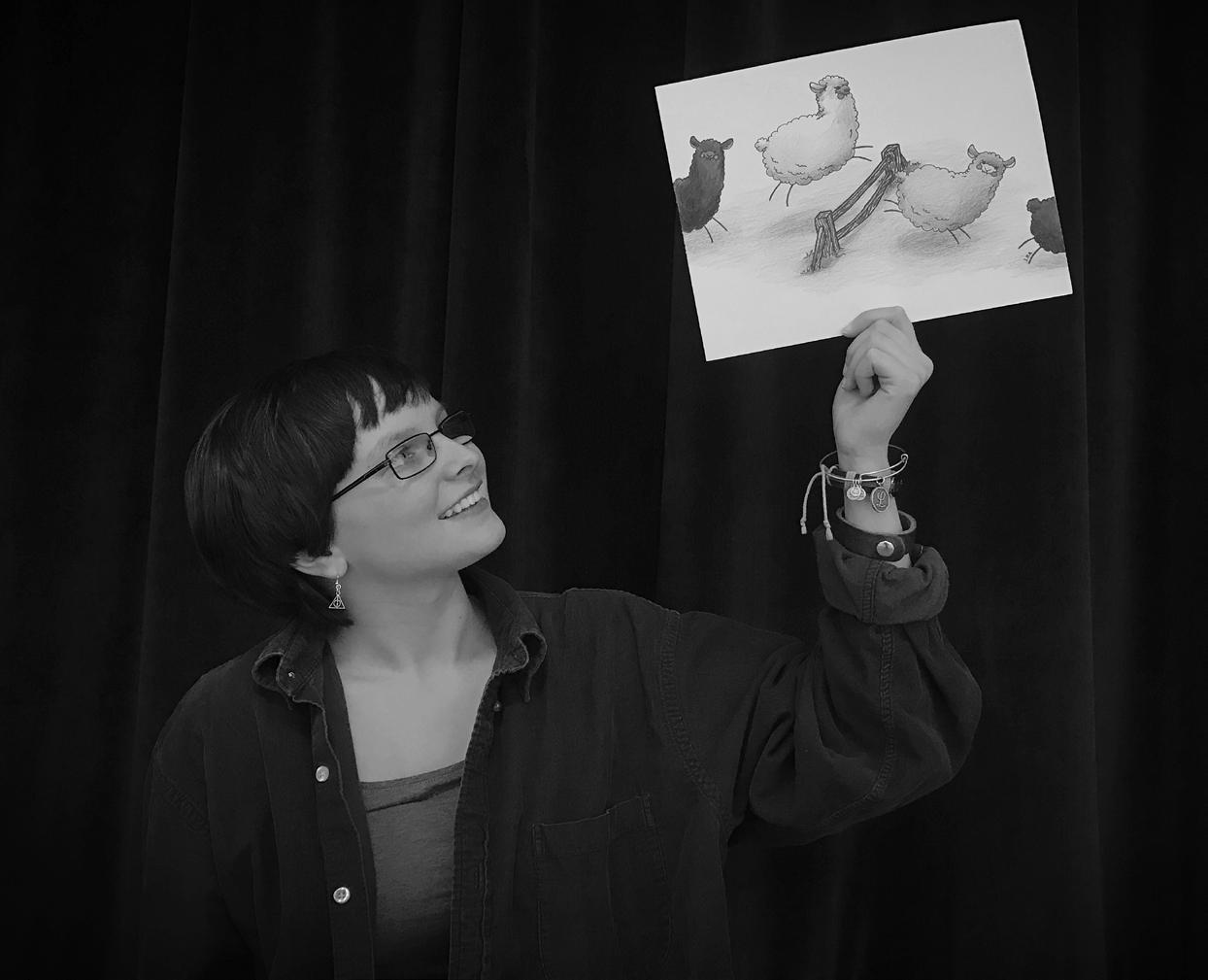












Aphantasia is a condition that has only been defined recently. People with this condition are considered “mind blind”; we cannot visualize things in our mind.
When you were little and couldn’t sleep, your parents would tell you to count sheep and so you did. You saw each fuzzy, baa-ing sheep leap across your make-believe fence, across a lush, green field. Perhaps there was a barn in the background and butterflies fluttering about. When I tried to do that, I saw absolutely nothing.
Don’t get me wrong here - people with this condition know what things look like and can describe them to you with all the necessary details. We know the name and physical traits of whatever you’re asking us to visualize, but picturing it is virtually impossible. Instead of images, I think solely in words, details to be more exact. In a way, my whole thinking process is a word association game. For example, when I think of a sunset, I list out all the components for a general sunset. I think of palm trees, a vast expanse of water with occasional waves, a glowing sun partially peeking out above the horizon, sand, and an orange/pink sky. Although I’m not very artistic, I can draw the whole scene out if need be. I may not be able to see what it is, but I know exactly what I am thinking of.
This doesn’t seem to affect one’s artistic skills though. Lydia Ahlstrom (‘17) also has aphantasia and is taking Advanced Art. She is currently putting a 30 piece AP Art Portfolio together. She explained her process for her average piece: “I base my drawings completely on what looks best on the page. I feel that if I was able to visualize scenes I would have trouble preventing myself from subconsciously manipulating the memory. Instead, I have descriptions or traits memorized that I base my drawing on.” When it comes to intricate details on a piece with no reference, she draws what seems to be logical to her. Aphantasia does not stymie one’s creativity at all. To compensate for her inability to visualize, Ahlstrom relies on what she knows to be true and what looks best on paper for her creations.
Everyone I have tried to explain aphantasia to has questioned whether or not I am able to dream. Yes, people with aphantasia can dream, but each person can go through a different process. The very few dreams I can remember entail previous memories and none of the dreams I can recall were completely fabricated from my creativity. As for Ahlstrom, she feels as though her mind is straining to come up with an image when she dreams; she ends up just knowing all the details through another sense.
Daydreaming is a little different for me. It still means I can’t actually “see” what I’m thinking of. Instead of recalling memories, I walk myself through different scenarios, making up different details that seem possible. It’s like a narrator in my head.
I grew up thinking that when someone says to picture something, they mean theoretically. I believed this to be true until this year when Ahlstrom and I were talking about her art class. She mentioned to me that she couldn’t picture anything in her mind and I immediately thought, “we’re supposed to?” All my life, I didn’t think that I was missing out on anything. I am able to read and
retain the words as well as see a painting and recreate it later- although it won’t be of the same caliber. I can recognize faces of those that I have met by recalling certain features and details about that person. Putting voices and faces together isn’t an issue either. Other than having to draw out shapes and graphs for math assessments, aphantasia hasn’t been a huge hindrance to me or Ahlstrom, but then again, we aren’t able to compare our experiences to anything else.
Professor Adam Zeman at the University of Exeter Medical School is conducting one of the largest studies about aphantasia, gathering experiences and background information from those who have it worldwide. He has estimated that 2.5% of the world’s population has this condition. Zeman believes that this condition can be a lifelong form or be caused by brain injury. Since it has only been recently defined, a lot of the details are still unexplored. There are short quizzes and a few official research papers published at this time; there will be more information about this condition in the future, but for now, we are only known as the people who just can’t count sheep.
- Megan WuIn a 1995 interview for a PBS documentary, Steve Jobs said “ev erybody in this country should learn how to program a computer, because it teaches you how to think.” We live in a world that is dominated by computers. Almost every student at Oyster River High School has access to a computer or smartphone, and most use these devices on a daily basis. Everywhere you look, there are students star ing down at their phone, or looking at a computer screen. But how many of those students actually understand how those devices work? How many know how to program?
“A lot of people can sit down and use a computer, but they might not know how things work, so I think programming is a great skill to have,” says Troy LaPolice (‘17), who has taken every computer class offered at ORHS. The importance and value of knowing how to pro gram is something that has been stressed in recent years. Over the next ten years, there will be an additional 1.4 million jobs in computer science, yet only 400,000 people will have the credentials to fill those jobs. This one million job shortage means that people with a back ground in programming are in high demand.
Even if you aren’t interested in a career in computer science, learn ing how to code can be a useful skill that is applicable to other fields. “Programming is all about making things work and solving prob lems,” says ORHS computer science teacher Cathi Stetson. “It’s not just the programming itself, it’s the logic behind it that’s important.”
During her time as a computer teacher at ORMS, Stetson and her
do my homework [in other classes] with programs I’ve made.” Guo is an example of an ORHS student who plans to pursue a career in Com puter Science. He has worked as an intern over the past few summers for a software company in China as a programmer and debugger, and is currently applying to be a computer science major in college.
Computer science is becoming an increasingly popular career choice because people are realizing the potential it holds. However, some stu dents believe that our current program at ORHS doesn’t give students the opportunity to build a strong background in computer science. “I know some people aren’t all that interested in programming, but I do feel like we need to make computer science a requirement,” Guo states, “learning to program will be very helpful to students in the future, even if they aren’t going into the computer science field.”
Adding an AP Computer Science course to the curriculum is a possi ble solution to challenge more skilled programmers who are interest ed in a career in computer science. “If it is something that people are interested in, I absolutely think it would be beneficial to add an AP class,” LaPolice says.


As we move further into the 21st century, the role of computers in society is constantly increasing. It’s becoming clear that program ming is a valuable skill to have no matter what field of study or career you choose to pursue. “If you’re able to think in the logical sense of putting a program together and making it work, that can be helpful no matter what job you have,” Stetson says.

students took part in the Hour of Code movement, which aims to spark interest in programming in people across the globe. Celebrities such as actor Ashton Kutcher, NBA all-star Chris Bosh, and President Obama have all endorsed this initiative where people take a one hour course that teaches them how to create a program.
At ORHS, there are two computer science classes available: Intro duction to Programming, and Advanced Programming. Intro to Pro gramming is an entry level computer science class where students use the programming language Python to write basic programs. In the Advanced Programming class, students learn to program in Java, a more powerful and challenging language. “We call it ‘Advanced Pro gramming’ but it’s just learning a new language that is a bit more difficult,” Stetson says.
In order to improve their programming background, several stu dents have taken online programming classes that offer more ad vanced material. One of these students is Yinan Guo (‘17), who is currently enrolled in an online AP Computer Science class. “I enjoy creating programs, it’s a lot of fun. Sometimes I’ve even been able to
Journalism is one of the few jobs that isn’t going to become irrelevant anytime soon. It has become even more popular over the years with social media taking the world by storm. But as the world of news evolves, there are still irreplaceable figures that remain relevant. Jackie Macmullan is a New En gland freelance sports journalist (and a UNH alumna), who has previously written for the Boston Globe, the NBA column for ESPN, and still frequently appears on the ESPN TV show called Around the Horn to talk about basketball. She has also written biographies of Larry Bird and Magic Johnson in the book When the Game Was Ours, published back in 2009, and even helped with Shaquille O’Neal’s autobiography. Needless to say, she is an accomplished and successful writer, but with encountering discrimination along the way, the journey to her current day situation wasn’t exactly seamless or easy.
MacMullan always had a love for two things: sports and writing. She discovered her enjoyment of writing articles back in fifth grade, where she went on a field trip that she wouldn’t stop talking about, and was asked by a teacher to write a paper on it, simply for fun. She continued to enjoy English classes all throughout middle school.
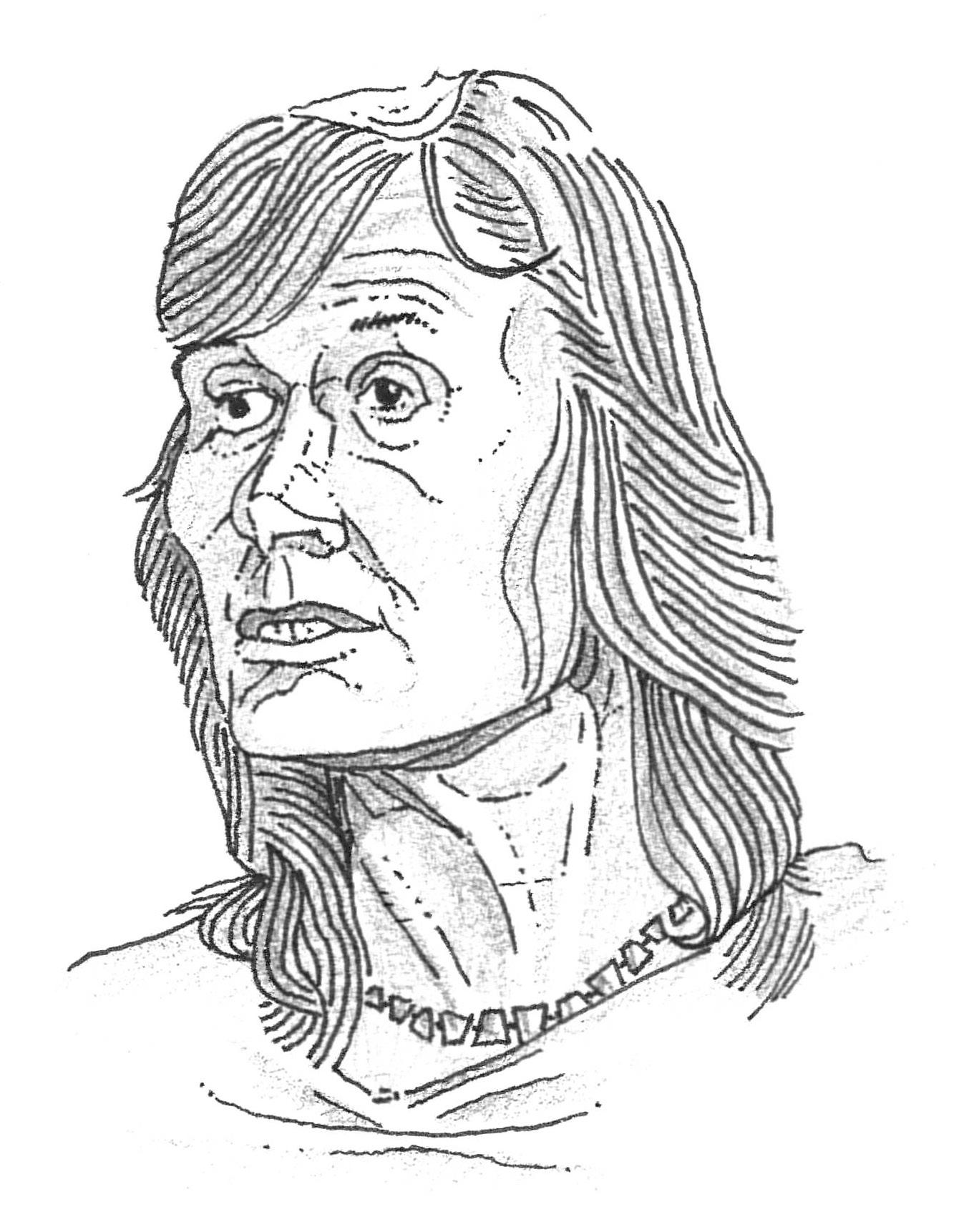
MacMullan went to Westwood high school in Massachusetts,
where they did not have any journalism classes: “The school newspaper only published once a year,” says MacMullan. The school sports teams included many talented women, but nobody ever bothered to cover their success. Title Nine (the amendment from 1972) states that there should be no exclusion on the basis of gender from any education program or activity receiving fed eral funding. This amendment was still pretty new, so there was still some noticeable inequality among the attention directed at the school sports teams. With MacMullan being a student-ath lete herself, it upset her that there was gender discrimination in her other favorite hobby: journalism.
When high school was over, she knew she wanted to pursue writing, but also play basketball. MacMullan thought she was going to Brown University after getting recruited by the coach: “I really wanted to go to Brown… But I didn’t end up getting admitted into the school itself,” says MacMullan. There were two other options for college: either travel to another state to play and study in Syracuse or stay closer to home and go to the University of New Hampshire. MacMullan considered herself a “homebody” and didn’t want to be too far from her family, so she chose UNH as her school.
She was grateful of how supportive her parents were and her
decision to become a sportswriter: “They weren’t very surprised,” states MacMullan.
Boston’s greatest athletes, including Larry Bird and Tom Brady, and can comfortably call them friends. MacMullan also got to meet some journalists she idolized growing up and enjoys watching younger journalists develop and improve.
She decided to say goodbye to full-time jobs since she wanted to spend more time with her husband, Michael Boyle, and their two kids, Aly and Doug. To her family, friends and neighbors, she is Jackie Boyle. But as she still continues to travel and be a freelance sportswriter, she calls herself Jackie MacMullan.
Being a professional sports writer since 1982, MacMullan has seen journalism evolve quite drastically over the years: “Social me dia is a little distressing honestly,” she says. “You have all of these blogs and people on Twitter who try to share their opinion and just label it as news.” It has morphed into a competition of who can report a story first, regardless of whether it’s accurate or not.
While studying in Durham, she played Division 1 basketball for the Wildcats with her 5’11” frame, while simultaneously covering other college sports.
At UNH, MacMullan had Pulitzer-prize winner Don Murray for a teacher, who taught English classes for 26 years. “It was unbe lievable how lucky I was,” she says, acknowledging how fortunate she was to have such a talented and successful writer as a mentor and educator.
Since UNH didn’t have a journalism program, MacMullan ma jored in English instead. But there were still plenty of internships for her to dedicate her time to, one of these internships was at the Boston Globe, where she was hired right after she graduated.
While starting out as a part-timer at the age of 21, she began writing sports articles for the Globe’s NBA Beat columns. Work ing as a female reporter, she often got a lot of flack for being the only woman in the press box at games; she faced discrimination from coaches, players, and other male writers. “I had a job to do. Equal opportunity was a lot more common in college than it was in the NBA, MLB, or NFL,” MacMullan says.
After being in the industry for quite some time, she has learned some key components that have contributed to her success: “It’s a competitive field,” states MacMullan. “Teach the reader something; don’t tell them something they already know. People can already know a player’s height or points. Discover personalities, pasts, or even something that makes someone tick. Reading and writing will always make you a better journalist.”
And lastly,
After working at the Globe for quite some time and receiving several awards and recognitions in the process for her coverage of some of the best sports moments in 80’s and 90’s, her boss decided to leave, specifically for a position at ESPN. This former boss of MacMullan had told her that ESPN was looking to amp up their NBA coverage. As she was considering taking this opportunity, the Globe offered her a full-time job. She decided not to take it after giving birth to her daughter, and eventually opted to write for Sports Illustrated part time.
She eventually did move to ESPN, where she gained a massive amount of respect as a writer since women were foreign to high profile sports media outlets. Over the years, she has met some of
“Don’t be first, be right.”
“Not everyone wants you there as a woman.”
“They knew I loved sports and writing… It was the perfect marriage of two things I love.”
As you may already know, Patrick O’Brien (‘17) has been on a tear for the boys’ cross country team. Setting records at both the Division II State meet and Meet of Champions, qualifying for Foot Locker Nationals in San Di ego, and committing to Dartmouth College are just a few of his many accomplishments this sea son.
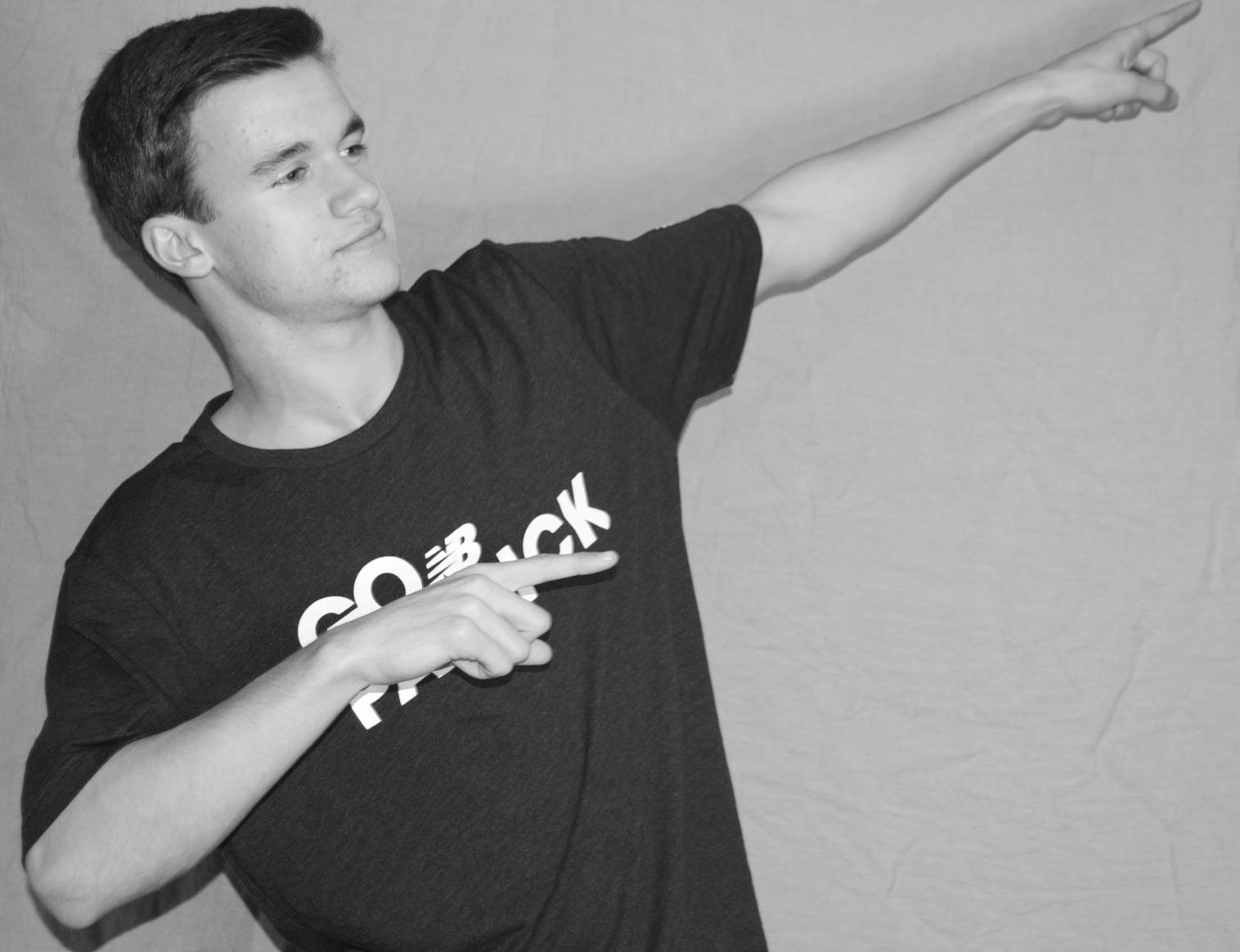
Before O’Brien became a record-breaking cross country runner, he was a competitive and moti vated kid who loved all things sports. It didn’t take long for him to realize cross country was something he could take to the next level. Pat rick O’Brien spoke recently with MOR about his road to success and what’s next for the Hometown Hero.
MOR: Having two successful runners as parents, was running something that was forced on you, or something that you chose?
Patrick O’Brien: It was kind of a mix of the two. I had grown up with both my parents running pretty much every day, so I was very familiar with it. In 5th grade, my mom had to urge me to join the team. I wasn’t too crazy about it. Eventually I gave in and decided to join. After that year, she didn’t have to push me to keep going. I got pretty good and enjoyed the success and started to like running. It turned into something I wanted to do.
Up until high school, running wasn’t your only sport. What other sports were you in volved in and what did you think of them in comparison to XC?
I played soccer for many years, which is the same season as cross country, and, believe it or not, it was actually kind of a decision for me if I was go ing to do soccer or cross country in high school. After I won the middle school state champion ship in 8th grade, the decision was pretty clear. I played baseball up until 6th or 7th grade, and I tried out a bunch of other sports to find the ones that I liked.
Was winning the middle school championship the first time you realized that you had potential to be a college runner?
Not exactly. In terms of realizing I was successful, I placed second at the middle school state meet in 7th grade, so I knew then that I had some talent with running. I don’t think I was thinking about college running in middle school. It wasn’t until my freshman year when I saw guys like Drew Thibault and Neil Mistretta who decided to keep running in college. At that point I thought maybe that was something I could do.
You mentioned some of the older team mem bers as people that you looked up to as a young runner. Did you have any other idols or role models?
My mom is definitely someone that I look up to. Being a two time olympic marathon runner, that was always something that inspired me. I was
very aware of her running accomplishments. Other than that, I would say all of the team mates I’ve had have inspired me to be the best I can be. It’s great to have people to train with and people to motivate you. I think they do a great job of that.
Is your mom someone who has been able to guide you throughout your running ca reer?
It’s definitely beneficial to have a parent who was so successful as a high school runner and beyond. She knows what she did for training, and obviously it worked for her, so my mom has done a good job of using her knowledge and collaborating with my coaches on what I need to be doing to train. There’s always been things she has emphasized that worked really well for her that she thinks would help me.
What does a typical week of training look like for you?
Monday is usually an easy day. It’s usually a day to recover. I run around six miles which is my lowest of the week typically. Tuesday is a workout day. It’s typically the hardest work out of the week. I’ve done 4 by 1 mile at like 4:41 pace, which means I run a mile at 4:41 pace, then have a few minutes of rest, then another mile at 4:41 pace, and I’ll do that a total of 4 times. Wednesday will be anoth er recovery day after the Tuesday workout, somewhere between 7 and 10 miles. Thursday
is usually a tempo run. We started out run ning 20 minutes at tempo pace, which is usu ally about 30 seconds slower than your 5k race pace, so around 5:20 for me. By the end of the season, we worked up to 30 minutes at tempo, and I think tempo runs were really beneficial to me this year. Friday is a mid-level run, usu ally between 8 and 12 miles. Saturday I’ll have a race during the season, but in the off season
I’ll usually do some kind of workout. For ex ample, sometimes I do a progression run for 6-10 miles, where I get faster every mile and work my way down to tempo pace. Sunday is a long run day. I’ll usually run about 16 miles.
What keeps you motivated through your intense running regiment?
I want to be the best I can be. I’m compet ing to prove myself to colleges. I just really wanted to have a strong senior season after what I would call inconsistent sophomore and junior years. I wanted to put in the necessary training to have that season, so my coach and I developed this training routine, and well, here we are.
Is running something that you enjoy?
Yeah, I think it is. I’m not going to lie and say every time I run I love it. There will be days where I hate myself for doing it, but other days it’s really rewarding. I’m not going to say I love going out for 16 mile runs week after week. It’s hard work, but I think it’s very re
warding and I really do like running.
The week of regionals you had the oppor tunity to meet some successful professional runners through your mom. What was that like for you?
The one guy I got to talk to the most was Ben True. The interesting thing about him is that he went to high school in Maine, and then went to Dartmouth. It was cool to talk to someone who has been there, and he only had good things to say. He was really nice and it was great because I’m a huge fan of his. I really enjoyed having the opportunity to meet him and talk to him, and then I watched him win the race he was run ning the next day against some of the other top American runners.
What is it like to get a chance to talk to someone like Ben True, who has been ba sically in the same spot you’re at now and gone on to have great success as a runner? It was cool. One great thing about Dartmouth is that if you look at some of the people that have gone through there, it seems like they often get someone really good that either goes pro or sometimes makes it to the Olympics. There was a woman from Dartmouth recently who made it to the Olympics in the 5k, and she’s just one of the many Dartmouth greats.
I had a pretty long list. There was a lot of re cruitment going on. It was pretty cool to be reached out to by all these schools. I was look ing for somewhere that could give me the best of both worlds, academics and athletics. I eventu ally narrowed it down to the point where I did official visits at Brown and Dartmouth. I went to Brown, and I really liked it. It was really cool, but then I went to Dartmouth the next week, and between the team and all the great places to run, I knew that was where I wanted to go. I really saw myself spending the next four years there.
How important is it to be close-knit and have good chemistry on a cross country team?
I think it’s critical to the success of the team. They get me pumped up to race. I’m always so happy when I see them do well. It’s really a brotherhood. If I see one of my teammates doing well, that motivates me, and I get motivated to race well for them. It’s important to me to not let my team down.
How do you feel about your cross country team right now?
We have a lot of fun together. I think I’ve had more fun this year than any other. We’re just a really close group of guys. We hang out all the time. We know each other really well. It’s awe some to do these races with them, and race for
them at the same time I’m racing for myself. I love doing well together.
What are you looking for when you’re going to these schools and trying to evaluate how strong their team chemistry is?
I was fortunate enough to be on campus for a couple days for my official visit. I stayed with a Dartmouth runner who I actually know pret ty well. I got to hang around the team a lot and they seem like really great people. They did a lot together. I went over one night and they were having a big fire with the guys’ and girls’ teams. It seemed like they were all pretty close. I ran with them the next day; we had a great time.
Are you nervous about making the transi tion to college?
I don’t really know what to expect. I don’t know if it’s going to be that much different
than being a high school athlete, in terms of the athletic part. I’m sure college schoolwork is going to be a lot different than high school. I know I’m not going to have to lead every step of every run. I’m excited to run with peo ple that were some of the best high school run ners in the country. I’m not as nervous about becoming part of the team as I am about go ing to college. I think being a part of a team and forming good bonds with teammates is something that comes naturally to me.
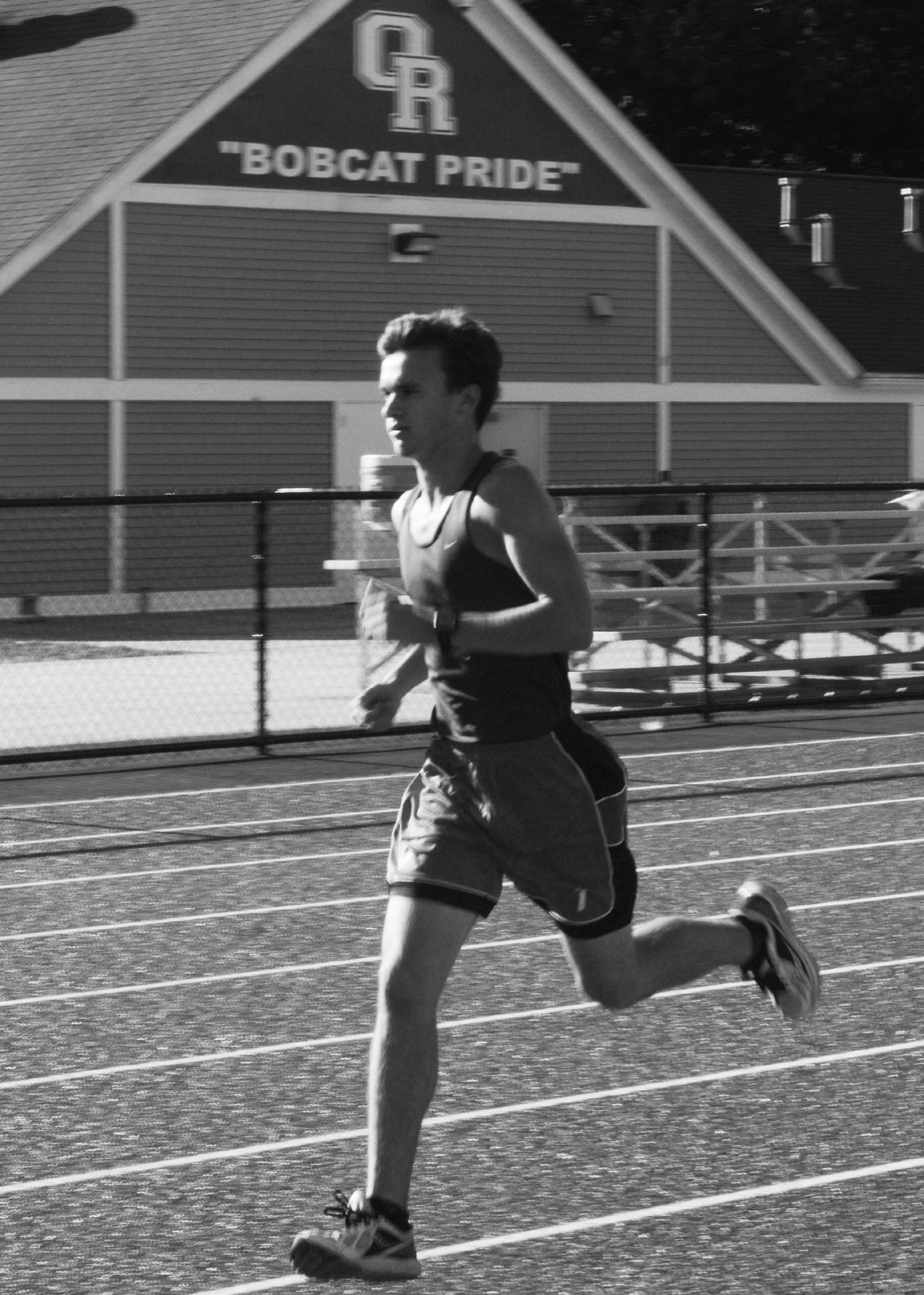
O’Brien’s December 10th run at Foot Lock er Nationals in San Diego, California marked the end of his decorated ORHS cross country career. He now looks to lead the indoor track team to another successful season. In just a few short months, O’Brien will graduate, then the next stop on his road to success is Dart mouth College in Hanover.
- Spencer Clark“I just gravitated to it at a young age and I decided it was what I wanted to do with my life by the time I was nine. My parents never told me differ ent, so I never felt the need to stop pursuing baseball,” said Brennen Ox ford, an Oyster River High School junior and future member of the Wake Forest University baseball program.
Oxford, who pitches and plays center field, knew he wanted to play base ball in college from early on.
He went through the rigors of the recruiting process and took a look at ten schools of interest. By the end of the summer Oxford narrowed down his list of schools to the University of Virginia, Boston College, Coastal Carolina University, and Wake Forest University. Oxford originally ver bally committed to defending College World Series of Baseball Champi ons, Coastal Carolina University, but later Wake Forest offered him a more significant role on their team.
On September 19th of this year, Oxford chose to continue his baseball career at Wake Forest University. He chose Wake Forest over his other options because of how established the baseball program is. Oxford also is interested in being drafted into the MLB and states that “Wake For est’s program is developed in the sense that they know how to get players drafted.”
Not only did Oxford favor the Wake Forest baseball program over other schools, but also admired its elite academic reputation. “Without baseball I wouldn’t be able to get in because it’s so good academically. Thinking about my life after baseball it was the best opportunity to accept,” said Oxford.
Oxford has been playing baseball since he was four years old, start ing with a local rec team when he lived in Newmarket. When he was in third grade he moved to Florida for a short time and soon returned in fifth grade. Since he was twelve he has been playing for the USA Mavericks club team as well. “Club took me from a good little league player to someone who could actually play and succeed at a high level,” said Oxford
Oxford says the people that have influenced him the most are his coach es because most of them have already played in college or professional ly so they know what it takes to succeed in the sport. “The people I’ve played with are also a huge influence because I’ve been lucky enough to play against Ryan McKenna and Kobie Taylor who both got drafted. And I’ve gotten to play with kids like Casey Aubin who have gone to a Division I program, so watching people do what I want to do has helped me,” adds Oxford.
“Everyone always told me how baseball is a sport that teaches you how to lose and I hate losing more than anything so I think that attracted me to it. It’s just been something I’ve always been able to do at a high level and something I’ve stood out in.”
Oxford’s competitive mentality has made him a good teammate. “He’s really exciting to play alongside because he is so special. It’s like you’re just constantly waiting for him to make that unbelievable play,” said Tyler McKenna, a teammate of Oxford.
Along with Oxfords’s teammates, his mom is extremely proud of what he has done. “We are beyond proud. He’s done a lot of work to get where he is and it’s paying off. There was a great feel of team and family when we visited. The coaching staff and players couldn’t have made us feel more at home and were really excited about all they’ve seen from Brennen,” said Colleen Oxford.
Oxford is truly a special player and high school coach, Craig Walfield, has enjoyed coaching him. “I have been coaching baseball for 32 years and have coached over a thousand ballplayers. Brennen’s skillset on the base ball field is probably the highest I have ever coached, he’s a five tool player,” said Walfield.
For those who have not caught up with Brennen on the baseball field, they likely know his voice as one of ORHS’s most prominent superfans. Bren nen’s school spirit and voice is unmistakable on the sidelines as he cheers on OR teams from soccer to volleyball.
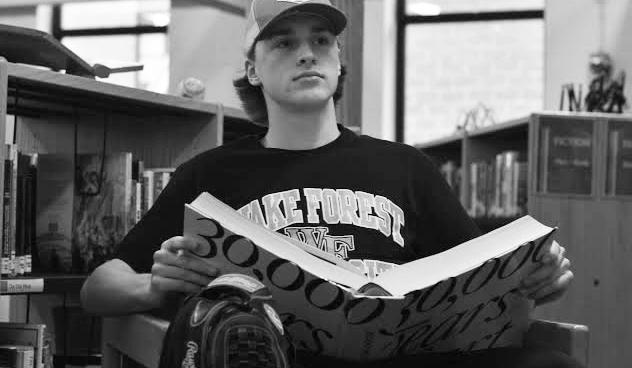

It’s Friday, September 7th and seven Oyster River High School students gather for an exclusive, invitation-only meeting. Prior to this meeting, 70 hours have been devot ed to compiling information, verifying statistics, looking at which candidate is superior to another. To put that in perspective, that’s almost three consecutive days of non stop preparation for this meeting. Spencer Clark, one of the founding fathers, enters the room equipped with three stacks of paper, two computers, and a booklet containing all the logistics of what is about to commence. Prior to this gathering Clark had individually spent 18 hours creating a mock draft in order to ensure success. The table was over whelmed with chicken wings, pizza, soda cans, papers, and seven computers prepared to draft fantasy football teams.
Here’s what I know about fantasy football: nothing. The slightest bit of information that I do know about fantasy football has been derived from three members of the Mouth of the River staff, who are always talking about their teams, their league, their wins, and their losses. Wikipedia is pretty useful when picking up the quick facts - and from what I’ve learned, the extensive number of football fans equates the number of fantasy football participants.

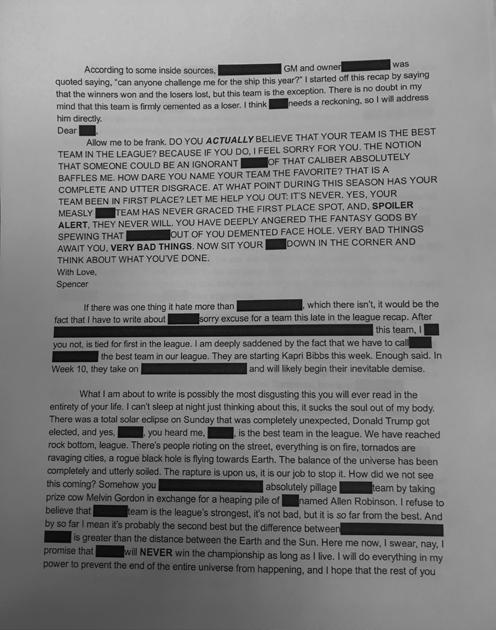
It seems a little ironic that when given a school essay assignment there is an intuitive thought that runs through students minds, something along the lines of “how long can

In my opinion, added competition is quite the understatement... I’ve heard of some pretty relentless verbal arguments over fantasy football throughout the halls of ORHS, and especially in the MOR classroom. Zach, Spencer, and Owen are always trying to one-up one another and reach a new level of supremacy.
I wish I could say as “Manager” of Kurtiak Fantasy Football team I had as much ascendancy as commissioner of the league, but I’ve got to build more knowledge and experience before I can reach that hierarchy.
“As commissioner, it is my job to keep order in the league. I have dealt with multiple scandals, including a trade that included a member accepting cash un der-the-table, diabolical attempts to try and put the best players from two com bined teams into one super-roster, and have also had to reinstate the majority of a member’s team, because they released most of their players in an enraged fit of protest,” says Ireland. I assume to the readers this fantasy football scan dal is quite the old news; who wouldn’t want to know about the infamous un der-the-table cash deals and the assembling of one super-roster.
After hearing the dirt about what goes on behind the screens of the ORHS 2016-17 league, how can you not feel inclined to join? If you’re anything like me and feel compelled to be involved in an activity so stimulating, you’ve got to know the ground rules about how the ORHS team is established each year.
“Member selection is a very important and secretive process every year. Be fore every season, a group chat is held between the Founding Fathers (Spencer
I put this off for?” But when it comes to establishing an ex tensive weekly league recap, that prioritizes all school work and must be finished immediately.
Ideally, you decide what league you want to be involved in. You draft a team of NFL players and once you’ve established a team, each week you set your lineup and watch the tele vised game for touchdowns, interceptions, yards, and other fundamental plays to generate points for the fantasy foot ball team. I can only imagine the shouts that are generated during a Sunday football game especially when you know that it’s crucial to rack up points for that fantasy football team. I guess from the perspective of someone who knows little to nothing about fantasy football... I’m curious, why do it?
“People find it so entertaining because it adds excitement to something that might not regularly mean a lot to you. It adds a more distinguishable personal aspect to a game that you might otherwise be indifferent on. It’s added competi tion among friends and - as anyone who has been in the core can attest to - it gives you something to talk about,” says ORHS 2016-17 league commissioner Alex Ireland (‘17). Yes, there is a commissioner title for fantasy football... Pretty big title if you ask me. Unfortunately, my title of “Manager of Owen Kuritak’s Fantasy Football Team” doesn’t quite meet the standards of what Ireland has to deal with.
Clark, Patrick O’Brien and I), who are the league’s oldest and winningest mem bers, to discuss who would be receiving an invite. Because this is Oyster River’s most competitive league, there are strict guidelines to who may receive an invite. You must clearly display a deep knowledge of football, and you have to have some sort of fantasy track record,” says Ireland.
Anson Thibault (‘17) met the certain criteria, as he was a new member of the ORHS league this year. “There is a level of uncertainty [with fantasy football] that I feel just adds to the dramatics. I personally enjoy it because it is fun to do with friends and a way to manage a team and see if your team will beat your friends,” says Thibault. Without an authoritative title, participants have one job and one job only: “I am solely there to try and beat the other league members,” says Thibault.
There is a lot of time and dedication that is contributed toward maintaining a distinguished fantasy football team, especially when standards are held so high at Oyster River. From the hours devoted towards watching football games, to the 4-page weekly league recaps, these players exemplify quite the staunch.
“Things can get out of hand, and there can be some brutal trash talk. But, as Charlie Crull would say, “At the end of the day, we’re all still friends,’” says Ireland.
- Katie SchmittSitting on a beach in Mexico during a family vacation, Ben Sulsky developed a plan to turn his $1,000 bankroll into $10,000 within a year by playing poker. At this point in his life, Sulsky was a sophomore at the University of Massachusetts Amherst, and was not playing the card game nearly as seriously as he once had. Less than a year later, Sulsky far surpassed his $10,000 goal, took a year off from college, and began his illustrious career as one of the most successful professional poker players in the world.
His journey began during his sophomore year at Oyster River High School. “Around 2004 , poker became a massive fad at ORHS and across the country,” said Sulsky. “At the time my friend Cy Watson was the acknowledged best player in the school and I was learning from him. By the end of high school, Cy and I were playing online and driving around after school to games in the area as far as Manchester.”
Rather than earning money from typical high school jobs, Sulsky spent his time playing online Texas Hold ‘Em. “At the time, online poker sites would give you up to $200 to play with and if you held onto it for some number of hands, usually over 200, they’d allow you to cash out the money,” explained Sulsky. By building up poker money he had cashed-out from online games, Sulsky had a respectable stash of $3,000 by his senior year at ORHS in 2006. It was at this point in Sulsky’s life where he began to seriously consider poker as a career. “Certainly my teachers wouldn’t have recommended it [as a profes sion],” he joked.
“What I remember most about [high school] with Ben and poker was how exciting it was for me to find someone as passionate and ex cited as I was about poker,” said Watson. “I wanted to talk about poker
all day every day and I finally found someone who wanted to talk with me.”
Although there’s no question he was an extremely skilled player at a young age, Sulsky took many things into consideration when deciding on whether he would pursue high er-stakes, professional online poker. “The fear with poker, and gambling in general, is that it will lead to addic tion, debt, and dead ends personally and professionally,” he said. “So, even though I knew I enjoyed poker from the beginning and could get good at it, I was very careful to never put up much money and to keep things fun.” As he neared the end of his senior year, Sulsky was ready to dedicate himself even more to the game he loved. However, one night nearly changed all of this, and very well could have ended Sulsky’s poker career before it had even developed.

In just one night towards the end of his senior year, Sulsky lost over $500 playing online. In pure anger, he cashed out all of the money he still had, and decided not to play as seriously for a couple of years. As time went on, a future in professional poker didn’t seem as probable.
“My biggest influences from Oyster River are the close friends I’ve kept from high school who are still my best friends today,” Sulsky claimed. It was one of these friends, Cy Watson, who played a major role in the reignition of Sulsky’s poker career. While Sulsky attended UMass-Amherst, Watson was at American University in Washington D.C. Sulsky still played poker online but was not as dedicated to the game as he was in high school.
One day during their sophomore years in college, Watson and

“The crucial insight for me was getting my hands on a program called PokerTracker which would store all my online hands in a database and furnished me with a ton of useful statistics,” he said.
This program can show players their win rate per 100 hands at vari ous stakes, and their standard deviation per 100 hands at various stakes. “Knowing these two quantities, [win rate and standard deviation], turned poker from something scary and unquantifiable, due to the luck factor, into something where luck was bounded by probability,” Sulsky said.
The feeling of support between Sulsky and Watson is mutual. Watson has enjoyed a successful career in both live and online poker (as well as fantasy baseball), and credits Sulsky in helping him throughout his own unique journey. “Ben has helped me in my career more than anyone else in my life. I feel extremely lucky to have met such a talented and trust worthy [friend] early in my life,” said Watson. “As far as the night he reinvigorated his passion for poker, I don’t remember the exact night, but I remember that time in our lives. We discussed a lot of strategy together.”
It was a few months later on that Mexican beach where Sulsky’s pro fessional poker career began. He left school and began to travel around the world to play at casinos. Although he enjoyed some success with this, Sulsky felt like the travel made it hard to have balance in his life. “A big part of that was getting married and developing a community of friends. That insight took me back to university, first at Reed College in Portland, Oregon, and later at the University of Toronto where I studied philosophy.” While at Reed and U of T, he managed to still play professionally and complete undergraduate school.
After graduating in 2010, Sulsky began playing online poker full time. At only 25 years old, within a year he had reached $1.21 million in earnings by playing Texas Hold ‘Em. Like many high-stakes professional players, Sulsky’s worth fluctuated frequently, regularly both earning and losing tens of thousands of dollars in a day. Under the nickname ‘Sauce123’, Sulsky quickly earned a reputation as one of the best online poker players in the world and surpassed a net profit of $4 million by November of 2012.
Not even thirty years of age, professional poker has already given Ben Sulsky a lifetime of accomplishment and failure, along with hundreds of incred ibly nerve-wracking moments. He has both made and lost over $1.2 million within a two-month span throughout his career. “I've made tons of mistakes,” he said. “Poker is all about mistakes, you just have to learn from them. I prob ably make a mistake every 5th hand I play, even now. I can't even get start ed with mistakes about which games to play and how to manage the crazy independence of being a professional poker player.”
Despite the incredible stakes and tension that being a professional poker brings, Sulsky takes pleasure in his profession, and manages to be one of the most successful players in the world. He has earned his winnings in a variety of types of poker games, like ‘Texas Hold ‘Em,’ ‘Omaha,’ and ‘8-Game.’ “The thing I've enjoyed the most throughout my career is playing the best players at the biggest stakes and generally coming out ahead,” he said. “It's been great to continue to push myself to compete in a worldwide player pool online with tons of great players and continue to prove myself.” He often plays one on one, or ‘heads up’ poker, for pots over $50 thousand, as opposed to larger tournaments.
Whether it’s luck, skill or a mixture of both, it’s hard to doubt that there’s a secret behind the glamour of Sulsky and his winnings. According to Cy Watson, the secret is simply effort to master his craft. “Ben got where he is today through hard work,” said Watson. “Ben has worked harder at poker than any of the other thousands of poker pros I know. This doesn't mean he has played a lot of poker, we all have played a lot of poker, it means he has done the hard homework nobody wants to do. While other people were improving the most fun way they knew how, Ben was improving the best way he could think of regardless of how hard and tedious it was. To put it in a sports analogy, Ben has been running sprints his whole life while everyone else practiced their three point shot. He would have been successful at anything he chose to do.”
With a current earnings profit of over five million dollars online, and an additional million from live tables, it’s fair to say Sulsky can forgive himself for that night in high school when he lost $500. The Oyster River grad currently ranks eighth all-time in online earnings. He currently resides in Toronto, where he plays online, and also travels to Las Vegas and Europe to play live tables.
(All data by highstakesdb. com presents accurate data from online games)

-Zach Leichtman
“Ben has worked harder at poker than any of the other thousands of poker pros I know.” -Cy Watson
